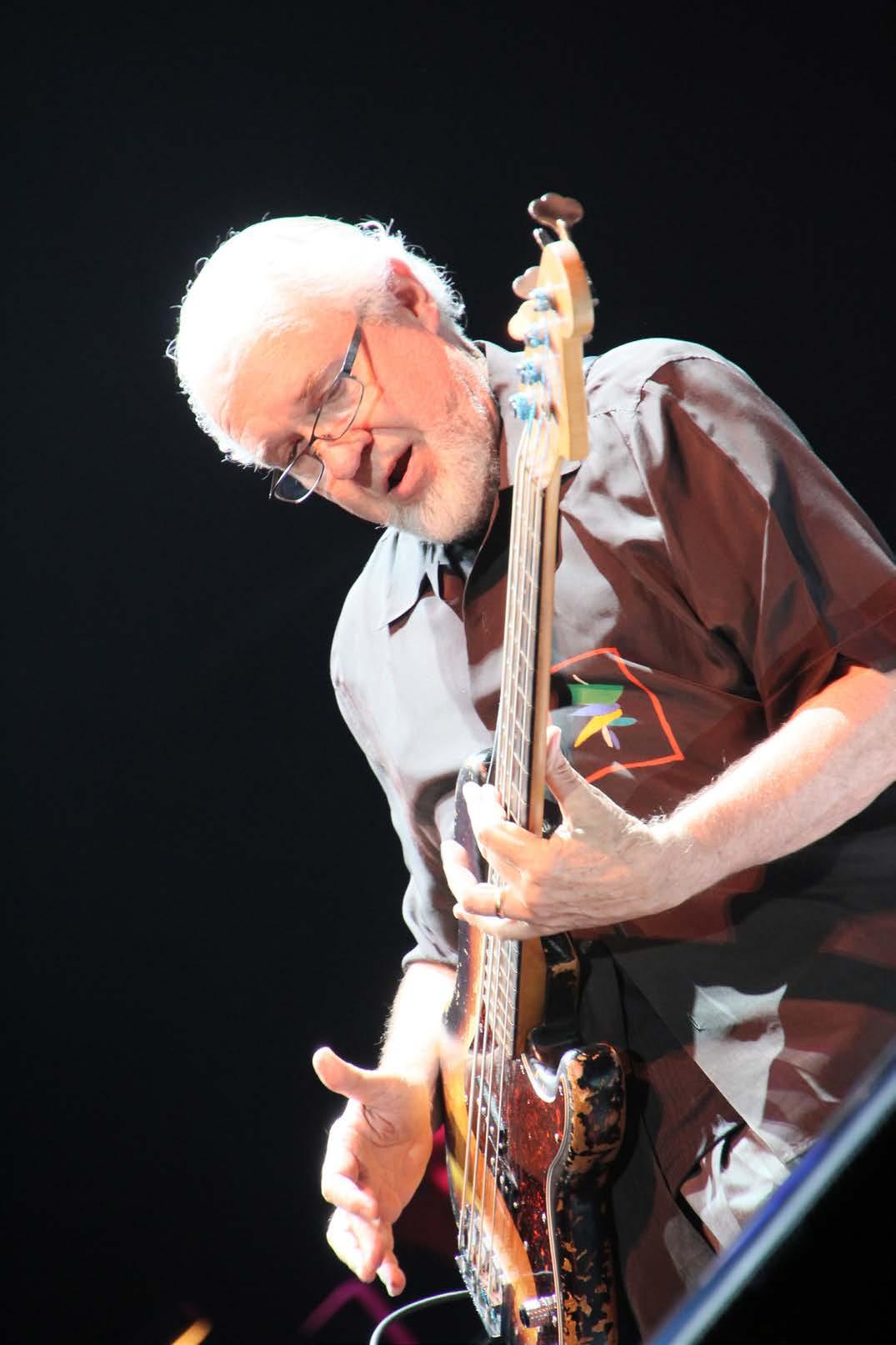

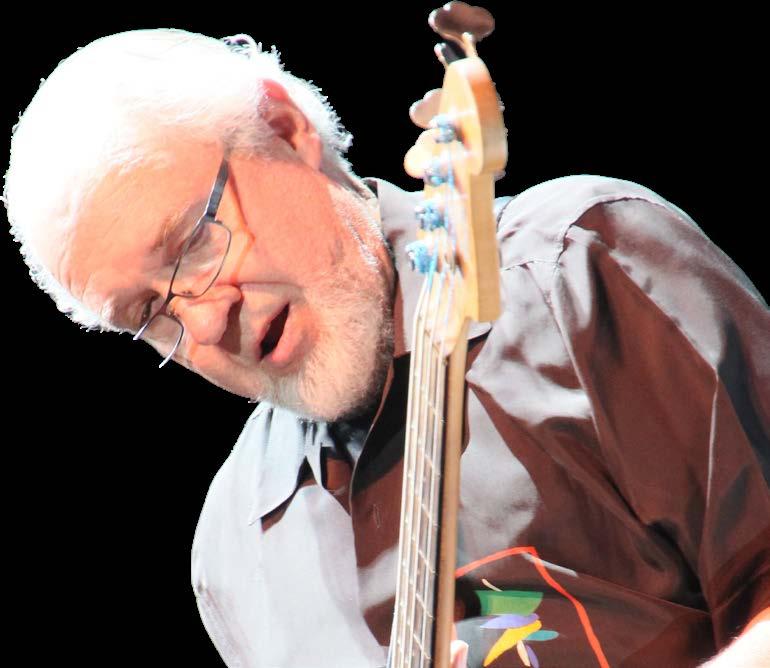
OFFICIAL JOURNAL OF AFM LOCAL 257 APRIL - JUNE 2023 REVIEWS: NASHVILLE SYMPHONY • JAMES TALLEY • LAURA PURSELL • TOBY’S HOUSE How he got to Nashville
Membership ZoomMeeting May 25 5:30 p.m.
Norbert Putnam

4 ANNOUNCEMENTS Details on the upcoming member meeting May 25 on Zoom, minutes and more.

6 STATE OF THE LOCAL Dave Pomeroy talks about community and diversity, engaging nonmembers, the evolution of our media contracts, and staff changes at Local 257.
7 BETWEEN THE NOTES Secretary-Treasurer Will Barrow on why we make music and how we make a difference in the world.
8 RECORDING Helpful tips on how to make sure your payment gets to you ASAP.
10 HEARD ON THE GRAPEVINE
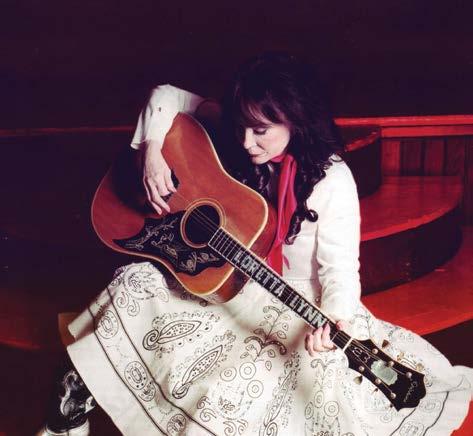
The comings and goings of Local 257 members.
11 NEWS Details on the new SRLA agreement ratified earlier this year, plus new agreements for CMA Fest and the General Jackson showboat.
12 GALLERY We recognize member milestones as well as other events and honors.
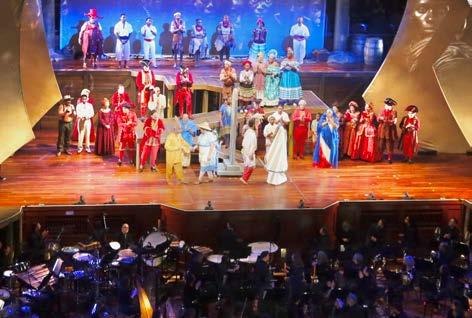
16 COVER STORY: NORBERT PUTNAM Warren Denney talks to the legendary musician and producer about the fascinating journey that brought him from Muscle Shoals to Nashville.

22 REVIEWS The history-making premiere of The Jonah People with the Nashville Symphony Orchestra; plus James Talley’s unique musical journey takes book form. Also in the section, Laura Pursell releases an album heralding her late father, pianist and arranger Bill Pursell, and accordion trio Toby’s House explores some uplifting as well as unexpected new territory.
26 SYMPHONY NOTES Melinda Whitley does a deep dive on audition protocol, and the host of rules that make the process fair and efficient for all.
27 JAZZ & BLUES Austin Bealmear offers an update on local jazz and blues including new releases, plus live music at schools, clubs, and festivals.
28 FINAL NOTES We bid farewell to Loretta Lynn, Anita Kerr, Jerry Whitehurst, Charles Flynn, Carol Campbell, Nestor Eaton, and Jeff Cook.
33 MEMBER STATUS
34 DO NOT WORK FOR LIST
APRIL – JUNE 2023 3 Official Journal of the Nashville Musicians Association, AFM Local 257 | APRIL — JUNE 2023
.
CONTENTS
16
NORBERT PUTNAM
22
NASHVILLE SYMPHONY
28
LORETTA LYNN
Cover photo courtesy of Norbert Putnam
OFFICIAL QUARTERLY JOURNAL OF THE NASHVILLE MUSICIANS ASSOCIATION

AFM LOCAL 257
PUBLISHER EDITOR
MANAGING EDITOR
ASSISTANT EDITOR
CONTRIBUTING WRITERS
The next Local 257 General Membership Meeting will be held virtually Thursday, May 25, 2023, by Zoom teleconference at 5:30 p.m. On the agenda are officer reports and discussions on a number of important issues. If you need instructions on how to join the virtual meeting with Zoom or by phone, please call the local at 615-244-9514.
Dave Pomeroy
Will Barrow
Kathy Osborne
Leslie Barr
Austin Bealmear
Warren Denney
Melinda Whitley
Roy Montana
Kathy Osborne
Dave Pomeroy
Leslie Barr
CONTRIBUTING PHOTOGRAPHERS
ART DIRECTION
WEB ADMINISTRATOR AD SALES
LOCAL 257 OFFICERS PRESIDENT
SECRETARY-TREASURER
EXECUTIVE BOARD
NASHVILLE MUSICIANS ASSOCIATION AFM LOCAL 257, AFL-CIO MINUTES OF THE EXECUTIVE BOARD ZOOM MEETING JAN. 30, 2023
Present: Will Barrow (WB), Dave Pomeroy (DP), Jonathan Yudkin(JY), Alison Prestwood (AP), Biff Watson (BW), Jerry Kimbrough (JK), Rich Eckhardt (RE), Laura Ross (LR).
Absent: Steven Sheehan (SS), Casey Brefka (CB)
President Pomeroy called the meeting to order at 8:45 a.m.
EXECUTIVE BOARD ALTERNATES
HEARING BOARD
Donn Jones
Dave Pomeroy
Lisa Dunn Design

Kathy Osborne
Leslie Barr
615-244-9514
Dave Pomeroy
Will Barrow
Jerry Kimbrough
Alison Prestwood
Biff Watson
Laura Ross
Steven Sheehan
Tom Wild
Jonathan Yudkin
Rich Eckhardt
Casey Brefka
Michele Voan Capps
Tiger Fitzhugh
Teresa Hargrove
Kent Goodson
Sarah Martin McConnell
Dave Moody
Paul Ossola
Minutes: No minutes were read.
Agenda:
President Pomeroy discussed the need to insert provisions for electronically held meetings into the by-laws. Provisions for such will be added in separate sections for executive board, hearing board and member meetings. The specific language in these new sections was displayed and read for Articles 1, 7 and 8.
There are fundamental leadership changes at AFM at the national level. The president, secretary-treasurer and vice-president are all stepping down.
President Pomeroy announced that he would run for AFM vice president in the upcoming election at the AFM Convention to choose successors for these positions.
Discussion:
Laura Ross discussed a convention resolution by ICSOM to make an amendment to the strike fund. Currently, the provisions for funding only extend to strikes and lockouts, and don’t cover natural disasters such as the pandemic, which can put musicians out of work for extended periods. The amendment will enable the fund to be available to those affected by such disasters, and our union is signing on to it.
TRUSTEES
Bruce Radek
Biff Watson
MSC to adjourn. RE, BW. Meeting adjourned at 9:45 p.m.
SERGEANT AT ARMS
NASHVILLE SYMPHONY STEWARD
OFFICE MANAGER
ELECTRONIC MEDIA
SERVICES DIRECTOR
RECORDING/ELECTRONIC MEDIA
DIRECTOR, LIVE/TOURING DEPT. & PENSION ADMINISTRATOR AND MPTF COORDINATOR
MEMBERSHIP
Steve Tveit
Melinda Whitley
Savannah Ritchie
Billy Lynn
Paige Conners
William Sansbury
Cassandra Tormes
Leslie Barr
HOLIDAYS
JUNETEENTH
Monday, June 19
INDEPENDENCE DAY
Monday, July 3 and Tuesday, July 4
LABOR DAY
Monday, Sept. 4
Michael Minton
4 THE NASHVILLE MUSICIAN
2023 Nashville Musicians Association
Box 120399, Nashville TN 37212
rights reserved. nashvillemusicians.org
@
P.O.
All
ANNOUNCEMENTS
NASHVILLE MUSICIANS ASSOCIATION
AFM LOCAL 257, AFL-CIO MINUTES OF THE 1ST QUARTER ZOOM MEMBERSHIP MEETING MARCH 2, 2023
Present:
Jeff Steinberg, Michelle Poe, Chris Carmichael, Tom Shed, Richard Wineland, Ellen Angelico, Regina McCrary, Luis Espaillat, John Mattick, Mark Dorminy, David Conrad, Joe Farris, Teresa Hargrove, John Arrucci, Matt Bridges, Tony Easley, Steve Ebe, Mike Webber, Lee Armstrong, Jerry McPherson, John Donahoe, Tatiana Cameron, Andrea Zonn, Roy Vogt
Executive Board Present: Jonathan Yudkin, Biff Watson, Tom Wild, Laura Ross, Rich Eckhardt (alt).
Hearing Board Present: Tiger Fitzhugh, Paul Tobias, Paul Ossola
Parliamentarian: Bill Wiggins
Officers Present: Dave Pomeroy, Will Barrow, Steve Tveit (sergeant at arms)
Trustee Present: Bruce Radek
President Pomeroy called meeting to order at 5:38 p.m.
Minutes from Nov. 3, 2022, membership meeting were displayed and discussed.
President’s Report:
1. In January the AFM finalized the sound recording negotiations, and the ratification process is ongoing. A 6-percent raise is being negotiated. Labels are being held more accountable, and are being reminded that work for hire agreements are illegal with union contracts.
2. There have been more personnel changes at our office; Heather Smalley has left her position here, as has Sarah Swensen. Billy Lynn has started as new director of recording.
3. There is a more diverse demographic happening at Local 257 than ever before.
4. We are getting out the message of how the union helps musicians protect their intellectual property.
Secretary-Treasurer Report:
We had a fairly major plumbing event recently, and needed to get pipes inside and outside the building cleared and checked out. We had a two-way sewer cleanout installed outside, and replaced two toilets that needed replacing. The total cost was a little over $2000, which was a big improvement over the first estimate of over $11,000. The old cast iron pipes that go from the building to the street will have to be replaced eventually, which will be expensive, but we won’t do that until we have to as they are fully functional for now.
The Wednesday workshops at the rehearsal hall are going well. Steve Leslie is doing his songwriter class on the first and third Wednesdays until he takes a break for a few weeks starting in mid-April. The world music workshop will feature samba next Wednesday, March 8, then on April 19 we’re having a very special performance by a world class group from Ghana that’s doing a temporary residency in Nashville, the Yeli Ensemble. On May 10, we’re going to do an Irish music workshop, which will include Jeff Taylor and some of the best teachers and players of Irish music in Music City. We’re still doing our songwriter jam on the last Wednesday of each month, and we welcome more song submissions and attendees at it. I’ll send an e-mail at the beginning of each month with details on the Wednesday schedule for that month. These are open to the public.
Agenda:
We are inserting into the by-laws language that allows for electronic meetings. The following by-law updates were shown:
1. Article 1, section 25: Relating to Executive Board meetings
2. Article 1, section 30: About Hearing Board meetings
3. Article 7, section 1: About membership meetings
4. Article 8, section 5: Rules for electronic meetings, and problems with secret ballots
5. Article 15: Concerning the election committee
The new language and by-law updates are approved unanimously by a voice vote.
Discussion:
1. The merits of electronic meetings are discussed, with Roy Vogt and Chris Carmichael detailing their benefits.
2. John Mattick brought up the issue of sync licensing, and questions about how the union can help musicians with this.
Motion to adjourn. Motion is made by Laura Ross, seconded by Paul Ossola
Meeting adjourned at 6:38 p.m.
NASHVILLE MUSICIANS ASSOCIATION
AFM LOCAL 257, AFL-CIO MINUTES OF THE 1ST QUARTER ZOOM NOMINATION MEETING
MARCH 2, 2023
President Pomeroy called the meeting to order at 6:39 p.m.
Agenda:
To hold a nominating meeting for an election of a new Local 257 Secretary/ Treasurer to fill the remainder of Vince Santoro’s term. Santoro retired in Aug. 2022, and Local 257 member Will Barrow was elected by the Local 257 Executive Board to serve as interim SecretaryTreasurer until an election is held.
Discussion:
President Pomeroy detailed the procedure and rules concerning the nomination and election of Local 257 officers.
Delegate nomination/election:
President Pomeroy asks for nominations for the office of Secretary/Treasurer. Laura Ross nominates Will Barrow, John Mattick seconds the nomination. After three requests for additional nominations, no other members are nominated. Will Barrow is elected by acclamation to the position of AFM Local 257 SecretaryTreasurer.
Motion to adjourn: Motion is made by Tom Shedd, seconded by Tiger Fitzhugh
Meeting is Adjourned: at 6:45 p.m.
APRIL – JUNE 2023 5 ANNOUNCEMENTS TNM
ABY DAVE POMEROY

nyone, including you, can make a difference in this world. Music is not only a method of artistic expression, both individual and collective, but a source of communication and commonality as well. During the pandemic, the power of music helped keep many of us from falling apart. Now, as the pandemic is finally loosening its grip on our reality, hopefully we can see the value in things that were too easily taken for granted before COVID-19 changed our world. We owe it to ourselves, each other, and the world to embrace the positive and move forward together to address the challenges that remain. Respect for each other, even those with whom you may not agree, is the key ingredient to our progress as a union, and for us as a country.
The recent school shooting at Covenant School in March brought the gun control and mental health debate to the fore, as we try and comprehend what could lead someone to this kind of horrific act. The fact that the shooter lived right around the corner from me made it that much more shocking and real. The political chaos within our state is most concerning as well, and like pretty much everything in life, if we want to see a change, it is up to each of us to express and manifest that desire, and make the world a better place by working together.
Strength in numbers
As we continue our 120th year of existence, we are grateful for all that has been accomplished by Nashville musicians, and know the best is yet to come. However, in order to accomplish that goal, we need your help. There are still many musicians who live in Nashville and work under our contracts regularly, who for some reason have yet to join the AFM. In most cases these nonmembers are working side by side with AFM 257 members. A lot of the pay they’re receiving is the DIRECT result of
The power of music
AFM and Local 257 negotiations — whether it’s the improved scale for CMA Fest, the new higher SRLA scale wages, or even playing a Trust Fund gig. Because of Tennessee’s right-to-work (for less) laws, this is technically legal, but that doesn’t mean it’s right. And the higher wages they enjoy as a result of the hard work we do for them is just one reason all professional musicians should be part of their local. Add in the “mailbox” money from new use and reuse of valuable work, and the other sources like the Special Payments distribution, health insurance, and free rehearsal space, and it’s hard to comprehend how any serious musician would not understand the value of our local.
Nonmembers may have misconceptions or other erroneous beliefs about union membership. Or, maybe they would just rather freeload than be part of a team that is looking out for ALL Nashville musicians. It’s time to bring them into the fold. In the coming weeks we will share information with you about how to approach them, as we want you to feel confident in talking to nonmembers about what we are already doing for them, and why they should join the team.
Nashville has always been a melting pot of cultures, and our ethnic diversity and artistic reach is increasing like never before. We represent artists from all styles of music, from superstars like Taylor Swift and Chris Stapleton to cutting edge world musicians such as Amigas Power and AfroKokoRoot. Nashville Symphony musicians are continuing to rebound from the consequences of the pandemic, and as always, they bring a very high level of performances to Music City.
Local 257 created the Low Budget Master scale back in the ‘90s, which caused a large number of gospel and independent labels to become new signatories to AFM agreements. Our Tracks on Tour concept, which we developed more than a decade ago, has brought more than $600K through the door to pay studio musicians whose tracks are used onstage. This is just the tip of the iceberg, and we are very proud of the
work we have done over the past 15 years to help our members survive a variety of challenges in the constantly changing work environment we call the music business.
These days, it is common for a recording project to start as a collaborative effort between songwriters, producers, and musicians. Many of you are very comfortable with multitasking and playing more than one role in any specific creative project. We have spent a lot of time educating those who play multiple roles so that they understand that if they are not on an AFM contract as a musician, the multiple revenue streams that a musician can get are unavailable.
Our job is to help you help yourself, but in the vast majority of situations, until someone lets us know what is going on, we are not able to help you. It is WAY more efficient to get a project covered at the beginning of the process, rather than after the fact. Once you know who the employer is going to be, you need to get in communication with us as soon as possible, so that we are not chasing a horse that has already left the barn! We know how to talk to employers so we don’t throw anyone under the bus for simply trying to do the right thing and get a project on the card.
Local 257 staff updates
Lastly, we have had some personnel changes at the office over the past few months, and things are moving forward nicely. Billy Lynn, who I have known for more than 30 years, is our new director of recording, and is already doing a great job. William Sansbury has moved from the front desk to the recording department, and is doing good work back there as well. Michael Minton is new at the front desk, and he has settled into his role as our primary contact with members and anyone who comes into the building. We appreciate everyone who works here, and just like the AFM, we are a team. Our No. 1 goal is to take care of our members and welcome any and all of those who are ready to join the only organization that has been looking out for Nashville musicians for 120 years and counting.
6 THE NASHVILLE MUSICIAN
STATE OF THE LOCAL
TNM
Why we play music and how we make a difference doing it
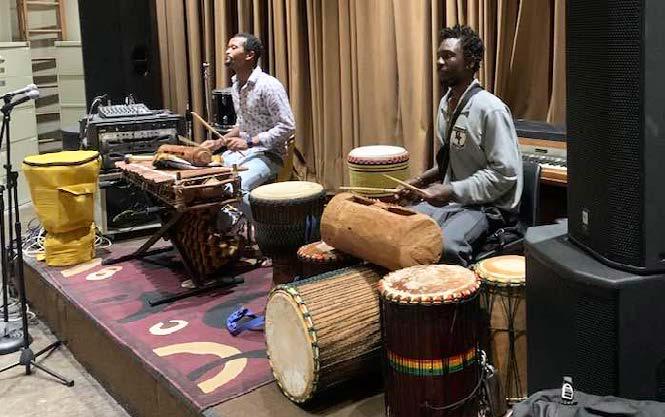
Happy spring to all. Nashville is becoming green and there is birdsong in the air. I’m happy to report that our union is in good financial stead. We are doing our utmost to see that musicians are fairly compensated for their work and creative property, treated fairly, and supported by their employers and the community. Our membership is growing and diversifying, and we have some great new people working for us, helping us to work more efficiently to get it done for our members. We have a lot of exciting things going on at our Local 257 rehearsal hall, with new offerings in the works.
And, as all of us are aware, our community in Nashville and in Middle Tennessee is dealing with a recent tragedy that impacted many — including me. It happened near my son’s school, and I know kids who go to Covenant, that thankfully were unhurt. I actually recognized the misguided young woman responsible for the devastating event, from my neighborhood, where she’d been living. There is much to be done to try to prevent tragedies like this, and much to be done to help the community to heal. Through this event I’ve also been made aware of something I’ve often thought about and experienced before, which is the healing power of music.
As professional musicians and union members, we’re brought together by the fact that we are passionate about music and earn our living from it. In my view, we’re also united by the fact that we serve a noble purpose in our community and in the world. We create, perform, and record work that uplifts, inspires, connects, unites and brings peace to a world that can sure use it.
We are therapists, teachers, healers, magicians and ministers with our music, whether it is intended or designed for those purposes or not. Music makes us more whole, and we impart that wholeness to the rest of the world, through our music. We make the world a more joyous and beautiful place, in all the various genres and mediums we create and work in, and to all the different audiences who experience it.
I try to remind myself of all these things when the sound system, groove, band or audience isn’t quite right at the gig or session, or when my creative juices aren’t exactly flowing. When I am successful in reminding myself of why I do music, and what is available through it, it brings me back into that space of gratifying music making and purposeful living, rather than just living, pretty much every time.
Here’s wishing everyone the power of remembering what music can give to us, and what we can give to the world through it. Happy music making, and peace — to all of us, and to the world we live in.
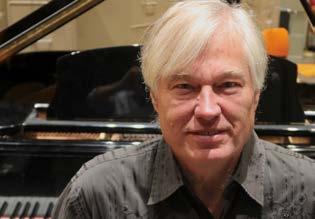 BY WILL BARROW
BY WILL BARROW
FREE Wednesday Workshops at Local 257
APRIL – JUNE 2023 7 Songwriting
June
1st and 3rd week 7-9 p.m. World Music 2nd week 6-8 p.m. Musician-Songwriter 4th week 6-8 p.m. For more information visit our Facebook events page @nashvillemusiciansassociation
with Steve Leslie
and July
BETWEEN THE NOTES TNM
The YELI ensemble April 19 at the Local 257 World Music Workshop
Local 257 tips to keep your money flowing
The payment process for recording, film, and television work has many moving parts, and we want to make sure we are doing all we can to keep the money flowing. This is a team effort, and your help is essential to make the billing and payment process more efficient. There are many things that can delay the payment process.
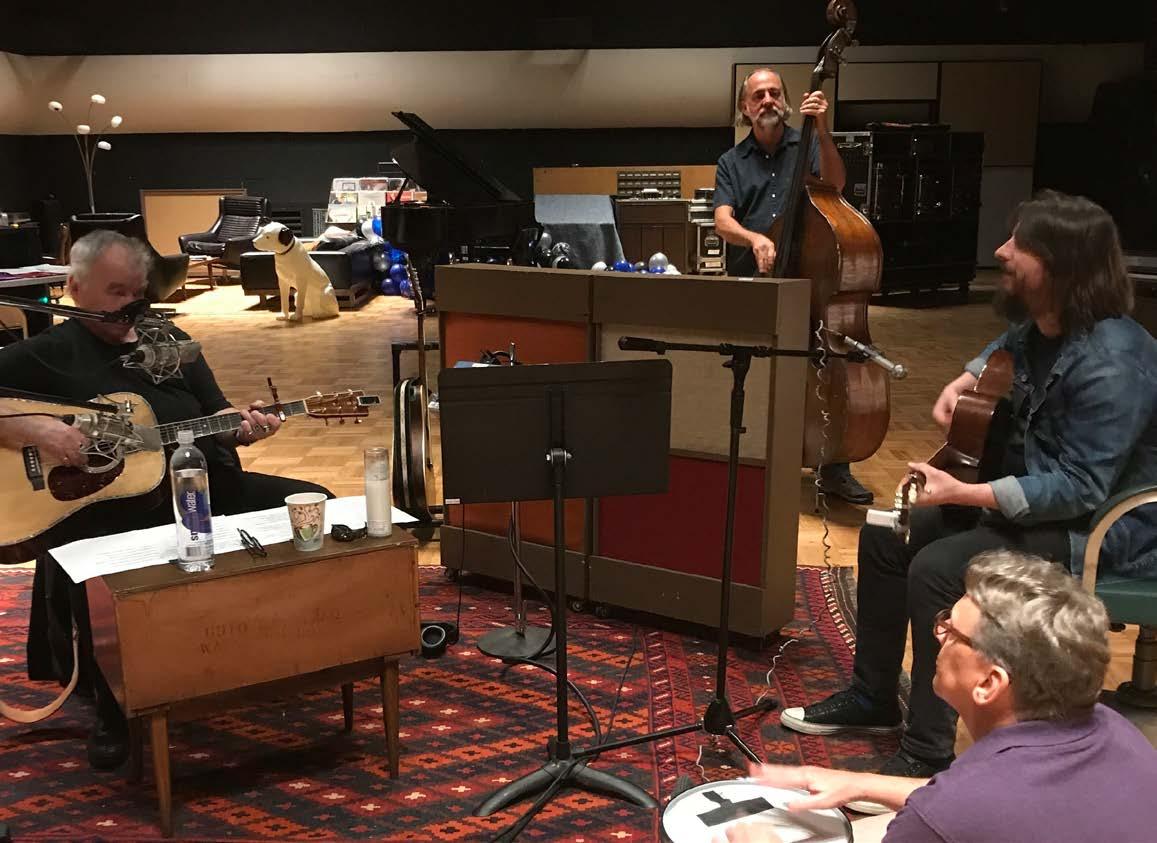
Payment problems:
1. Late filing of time cards, which delays the creation of contracts, making various problems more likely that can happen after a contract is billed to the employer.
2. Missing and/or incorrect signatory information creates multiple problems, including billing the wrong company or individual, which slows everything down.
3. Employer’s failure to file a Low Budget Master request for AFM approval in advance of the session is another way things can go wrong, and delay your payment.
4. When an employer marks “paid direct” on the time card, but fails to pay the musicians the right amounts properly and promptly. That is what “paid direct” means. We have no way of knowing this has happened until someone brings it to our attention long after the fact.
8 THE NASHVILLE MUSICIAN
RECORDING
Steve Wariner and the MHOF band
Payment solutions:

1. Filling out a session time card correctly and completely is an essential first step. That includes correct song titles, who is responsible for payment to musicians and the pension fund. This includes the billing contact information for the employer.
2. If a P.A. (production assistant) or someone other than the leader is generating an invoice, please make sure they collect and input your information correctly, including whether or not you were “paid direct.” Time cards are available at the office and online.
3. Please make sure that your email, contact info, mailing address, and W9 and/or W4 info in our system is up-todate. Employers often use old addresses rather than checking with us. If it’s updated in our system, we can help make sure your money gets to you.
4. When musicians get “paid direct” at the session, it is the leader’s responsibility to make sure the amounts are correct, and we are notified that those payments were received. Payment arrangements for the pension contributions must be made as well.
This filing and billing process is at the core of what we do, and when things go wrong, we are just as frustrated as you are. We understand that timely payments are an important and sensitive topic, and to those of you who have weighed in about this, we want you to know that we hear you and share your concerns. Our recording department is very focused on these issues. We are in discussions with various financial institutions, our CPA, and others, about ways to monitor and make electronic payments more practical, secure, and verifiable without violating labor law or the financial rules we deal with as a nonprofit labor union.
We never bill musicians for work dues until we verify that all musician payments, and the Pension Fund contributions have been made. And, after you are paid and your work dues bill comes in, remember; Your work dues keep the Local 257 engine running and working on your behalf, so we appreciate you paying those bills when you get them. Communication, cooperation and mutual respect between employers and musicians is what made Nashville into Music City, and by working together, we can keep the money flowing in the right direction. Thanks in advance for your help in this collective effort to get musicians paid what they deserve in a prompt, professional manner.
TNM
RECORDING
RANDY TRAVIS AND GEORGE JONES
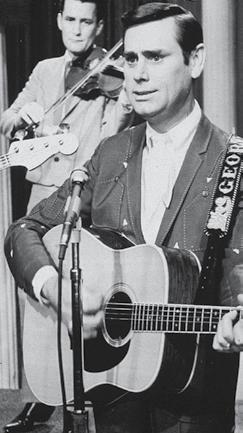
36-year Local 257 member Randy Travis joined a list of performers who appeared at “Still Playin’ Possum: Music & Memories of George Jones,” an event held April 25 in Huntsville, Alabama. The show was filmed for an upcoming television special, and featured tributes to Jones. Other artists on the bill included Gretchen Wilson, Wynonna, and Jamey Johnson.

Jones’ singular vocal style graced some of the most memorable country songs of all time, including the Grammy-winning “He Stopped Loving Her Today.” He had 165 hit singles, including 13 No. 1 records and received countless awards and honors over the course of his career. He was inducted into the Country Music Hall of Fame in 1992. Jones joined Local 257 in 1956 and at his passing was a 57-year life member.
“George’s music still lives on and I am so honored that so many of George’s fellow artists and friends have agreed to come to celebrate him,” said Jones’ widow, Nancy.
BRENT MASON
Guitarist Brent Mason will be featured in the latest Nashville Cats interview series presented by the Country Music Hall of Fame and Museum May 20 in the Ford Theater. The event highlights touring and recording musicians who have made significant contributions to the music industry. Mason is a perfect choice, as he is considered to be one of the most recorded guitarists in history. He joined Local 257 in 1981 and is a 41-year member.
He’s been named the CMA Musician of the Year twice, and the ACM Guitarist of the year a record 11 times. Mason estimates he’s played on over a thousand Billboard Top 10 hits over his four-decade career. In 2009 he won a Grammy for Country Instrumental of the Year for his work on Brad Paisley’s “Cluster Pluck.” He’s also recorded two albums of his own and had multiple cuts as a songwriter.
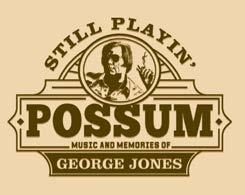
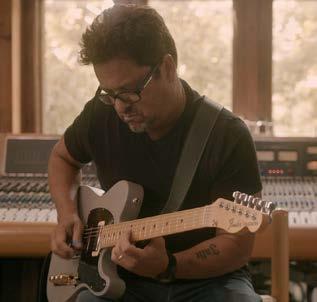
The interview will be illustrated with archival photos as well as audio and film clips. Following the program, Mason will sign commemorative Hatch Show Print posters.
KERRY MARX
Guitarist and Grand Ole Opry Music Director Kerry Marx will be inducted into the South Carolina Entertainment & Music Hall of Fame June 3 in Greenville, South Carolina. Marx joins 65 prior inductees that include Aaron Tippin, Dizzy Gillespie, Minnie Pearl, Hank Garland, and James Brown. The event honors natives or others with connections to the state, who have gone on to achieve national success in their field.
Marx was born in Shelby, North Carolina, Jan. 26, 1954, and grew up in Aiken, South Carolina. He played bass and guitar as a teen, and studied music at the University of South Carolina. He also attended North Texas State University in Denton, Texas, before moving to Nashville in 1981. In addition to his work on the Opry, Marx is a sought-after session player who has worked on a variety of jazz, pop, rock, and country records. He has played on countless jingles as well as on projects for the major networks, Disney, CMT, and the Dick Clark company. Marx is a 41-year life member of Local 257 who joined in 1981.
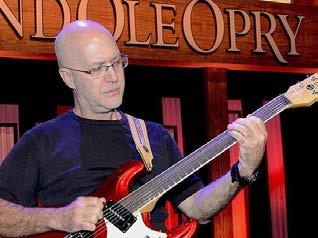
10 THE NASHVILLE MUSICIAN
HEARD ON THE GRAPEVINE TNM
New SRLA ratified
Anoverwhelming majority of eligible AFM members voted to ratify a new Sound Recording Labor Agreement (SRLA) last month, completing the approval process for the contract with major labels and their affiliates. The longstanding national agreement affects Master, Low Budget Master, Traditional Music Video, Live Concert, and Internet Only Video scales, as well as other variations of recording contracts. The eligible voter group includes AFM members who made more than $2400 in SRLA wages between April 1, 2020 and March 31, 2022.
The new three-year contract has scale raises of six percent in 2023, three percent in 2024, and three percent in 2025. Health & Welfare payments go up in year two (first service of the day goes from $28 to $30) and year three (second service goes from $22 to $25) The AFM-EPF contribution rate remains at 14.09 percent of scale, which is paid separately over and above all session wages. Cartage rates also remain the same.
The six percent scale increase took effect April 3, 2023.The following mini-chart shows the side musician rate increases to the most commonly used Master scales. Leader is double scale.

After the ratification, Local 257 President Dave Pomeroy thanked members and employers for their continued efforts to keep work on the card. He talked about the strategic importance of the ongoing education of nonmembers on the vital connection between AFM negotiations and the resulting contracts with employers that protect musicians, and keep their wages growing.
“Nashville has a higher voluntary compliance rate with AFM agreements than any other local in the Federation. We are proud of this tradition, but we couldn’t keep it going without the support of our members. There are still a few players who somehow still don’t get it, and have not yet joined the only organization looking out for their best interests. We can use your help in respectfully urging them to join the team. We are seeing a surge in young and increasingly diverse new members, and we are doing all we can to educate them about why recordings should be documented with an AFM contract.
“We need to let nonmembers know that without an AFM contract, what they make that day is all they will ever make, and will never include pension contributions, New Uses, royalties and residuals. We are here to help you protect yourself, and that starts with an AFM contract,” Pomeroy said.
If you have questions about the new rates, or need any information about recording contracts in general, call Local 257 and ask for the Director of Recording, Billy Lynn. You may also visit our website for more information at nashvillemusicians.org
Pay raises for CMA Fest and General Jackson musicians
Local 257 has reached an agreement with the Country Music Association to revamp the pay scale for CMA Fest. The new agreement has no leader scale, but pays $170 per engagement for all players, a significant raise of 100% for Thursday and 60% for Friday and Saturday. We have also successfully renegotiated the General Jackson showboat contract. The show musicians will get a 3% pay raise for shows, a 6% raise for rehearsals, and an additional 2% bump for the holiday shows at the end of the year.
APRIL – JUNE 2023 11 NEWS
TNM
“Nashville has a higher voluntary compliance rate with AFM agreements than any other local in the Federation. We are proud of this tradition, but we couldn’t keep it going without the support of our members.”
Playing Out and About
3. Vocalist/percussionist Sunny Dada and his Afrobeat group, AfroKokoRoot, perform at the 5 Spot in East Nashville. AfroKokoroot also led one of our new world music workshops earlier this year at the local rehearsal hall.
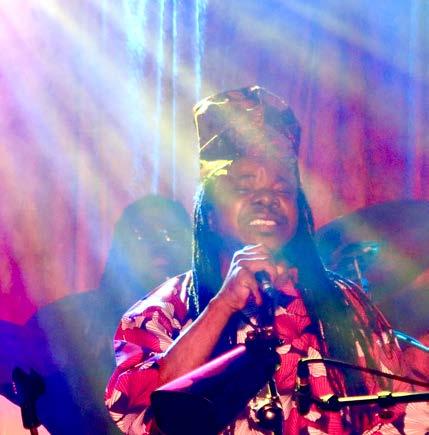
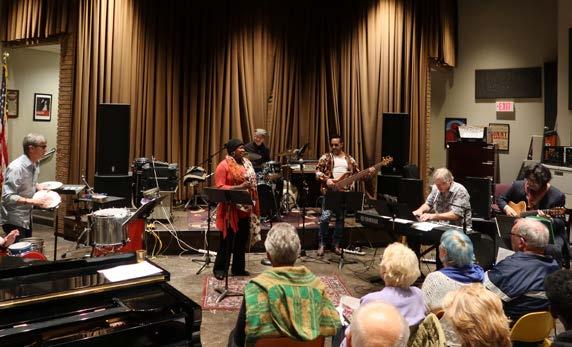
NJW Plays Music for Seniors
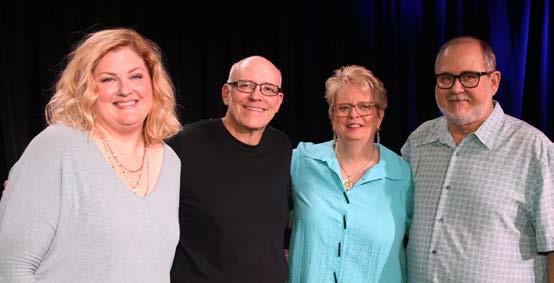
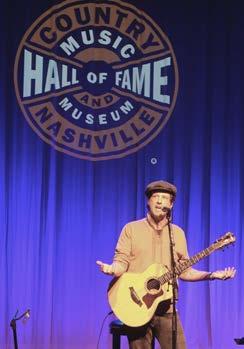
April 21st, funded by the Music Performance Trust Fund.

 1. Devin Malone performs for the Country Music Hall of Fame’s Musician Spotlight series.
2. Will Barrow and his group Tudo Bem demonstrate various samba and percussion styles at the Local 257 monthly world music workshop.
1. Devin Malone performs for the Country Music Hall of Fame’s Musician Spotlight series.
2. Will Barrow and his group Tudo Bem demonstrate various samba and percussion styles at the Local 257 monthly world music workshop.
GALLERY
2.
1.
3
LORI MECHEM GROUP pose on the NJW Jazz Cave stage after a performance for MUSIC FOR SENIORS
(l-r) Vocalist Christina Watson, drummer Chris Brown, pianist Mechem, and bassist Roger Spencer.
PHOTOS: DAVID THOMAS
AFM MEMBER PINS
1. Roger Carroll with his lady Amy Grassham, his new pin and his ‘71 P-Bass.
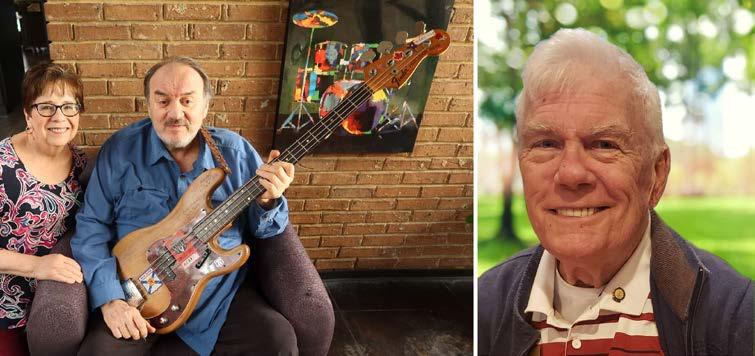
LIFE MEMBER
2. New 50-year life member Roger Carroll shows off the many musician signatures on his bass guitar. Look close, you may be in there!

3. Drummer Dave Berry proudly displays his new Local 257 50-year pin. A member of the Atlanta Country Music Hall of Fame, Berry played with Del Reeves and many other artists during his career, including Johnny Carver, Tanya Tucker, Ray Price, Crystal Gayle, and Freddy Fender.
The AFM International Executive Board & FIM
The AFM International Executive Board met in New York City with the leaders of Federation Internationale de Musicians (FIM), of which the AFM is a proud member. The organization heads discussed their many mutual issues and areas of interest.
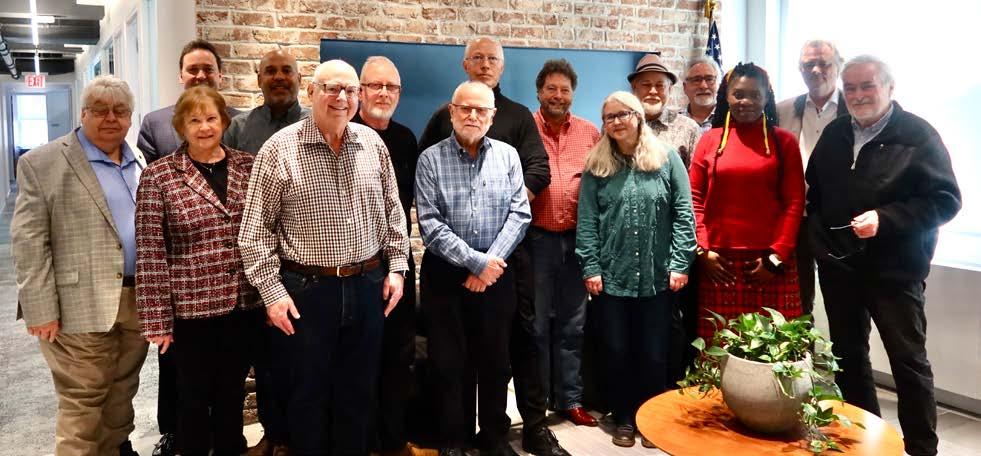
continued on page 14

GALLERY
1.
2. 3.
1. Legendary keyboard man Bob Wilson, now living in Detroit and Florida, stops by the office to tickle the ivories and reminisce about playing with Earl Scruggs, recording with Bob Dylan, and more.
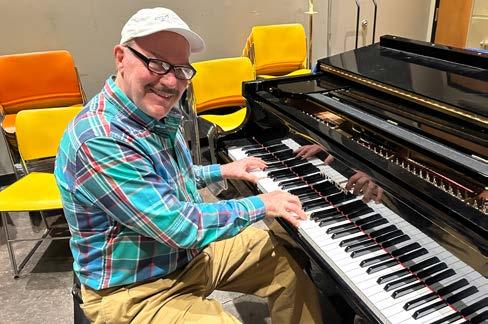

2. NSO violist Chris Farrell beautifully performs Suite No. 2 for Solo Viola at the annual BACHanalia festival — a celebration of J.S. Bach — at Christ Church Cathedral in Nashville.
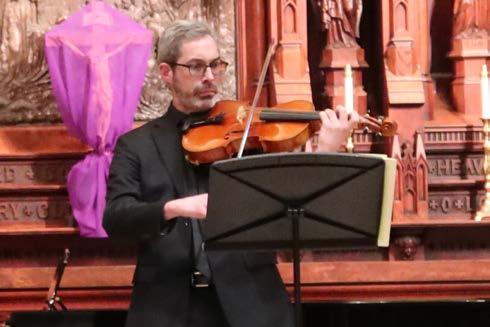
3. Life member Charlie McCoy stopped by the local to meet new Recording Department Director Billy Lynn (r), along with William Sansbury (left), recently promoted from membership coordinator to recording department assistant.


4. Violinist/vocalist Alison Brazil (center) welcomes two new AFM 257 members, Rachel Rodriguez and Marcela Pinilla. The trio perform together as Amigas Power, a fitting name!

GALLERY continued from page 13
1.
3.
2.
4.
TNM
l Interactive version free online at nashvillemusicians.org and issuu.com
l Distributed at Summer NAMM each year to thousands of musicians
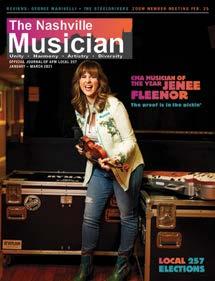

l Only Nashville publication that guarantees access to an exclusive demographic


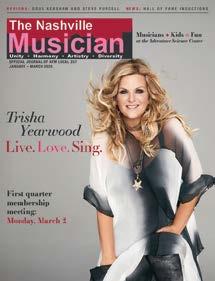
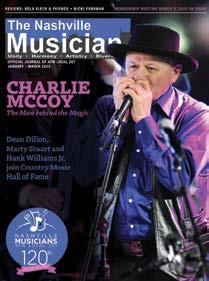


l Great rates and online plus print packages available

APRIL – JUNE 2023 15 THEY ARE ALL MEMBERS OF THE NASHVILLE MUSICIANS ASSOCIATION! Advertising in The Nashville Musician is a cost–effective way to reach professional musicians, high-profile artists and music business executives. WHAT DO TAYLOR SWIFT, KELSEA BALLERINI, JAY JOYCE, AND THE MUSICIANS OF THE NASHVILLE SYMPHONY HAVE IN COMMON? continued on page 18 RAYSTEVENS Ray Stevens moved behind his desk and settled in for conversation. He was at home, in his office at the CabaRay Showroom complex on River Road in Nashville, contemplating the reopening of the venue in September, still weeks away at the time. He was “home” primarily because he was doing what he does every day — tending to his career and to the responsibility of being Ray. Life Is a CabaRay BY WARREN DENNEY done now for well into eight decades, come hell or high water, pestilence or pandemic. He does what he does, and at age 82, can look back on a life unimaginable to the child that grew up in Albany, Georgia. Stevens, born Harold Ray Ragsdale in 1939, is singer, songwriter, an arranger, producer, publisher, multi-instrumentalist, and TV star — in no particular order, but all of a high order. In spite of his well-crafted persona as comedian, and writer and performer of monstrously popular novelty songs, Stevens is considered one of the most gifted, multi-talented artists of his generation. He is two-time Grammy winner, most notably as Male Vocalist of the Year in 1970 for the timeless “Everything Is Beautiful,” a member of the Nashville Songwriters Hall of Fame, the Georgia Music Hall of Fame, the Atlanta Country Music Hall of Fame, the Christian Music Hall of Fame, and was inducted into the Country Music Hall of Fame in 2019. He has had six Top Ten hits on the U.S. country or pop charts, including two No. 1’s with “Everything Is Beautiful” and “The Streak.” These are the fruits of his labor, the things he holds, as he goes about his daily business. He is proud of what he has accomplished, and the showroom at CabaRay honors that life. And, Stevens is all that because he frames his world clearly — there is humor certainly, there is love and beauty, there is sadness — but above all, there is music. “I liked all kinds of music [growing up],” Stevens said. liked country music. My dad was raised on farm, and he loved country music. was influenced by him. His favorite singer was Lefty Frizzell. And liked Eddy Arnold. liked all kinds of people. And of course, pop artists like Patti Page used to cross over little bit with ‘Tennessee Waltz’ and things like that. “But, the more learned about music, the more of a musician became, and the more appreciated the nuances in all styles of music. And country music is no different. mean, show me a good steel guitar player, and I’ll show you hell of musician.” He could appreciate those nuances because he was an advanced musician by the time he reached his teens. He was ripe for discovery, and following his family’s move from Albany to Atlanta, Stevens met publisher Bill Lowery, and took first, small step into his musical career. He was introduced to Lowery while still attending Druid Hills High School. “I was in high school,” Stevens said. “And, went to Clairmont Hills Baptist Church. My Sunday school teacher owned a radio station in Decatur — WEAS. must have gotten up in church and played the piano, and sang or something. Anyway, he told me one morning in Sunday school class, needed to meet Bill Lowery. Lowery had just started his publishing company and was looking for songs. met him, and he said ‘Lad, write me song.’ “So went home that night all pumped up, and wrote a song and took to him. was a good song and he liked it.” Lowery called his friend and producer, Ken Nelson, at Capitol, who liked what he heard, and signed Stevens to Prep Records, subsidiary label. Lowery suggested he change his name, and Nelson brought him to Nashville to record “Silver Bracelet,” a regional hit out of Atlanta for the young 17 year old. That was 1957. “I had come to Nashville to make a record,” Stevens said. “Bill knew the studios in Atlanta weren’t up to par at the time. He moved his office out of his basement, which was the first place met him, into an old grammar-school house in Brookhaven, Georgia, which is out West Peachtree. And had lunchroom, and we turned that into studio. The more learned about music, the more of musician became, and the more appreciated the nuances in all styles of music. And country music is no different. mean, show me a good steel guitar player, and I’ll show you a hell of a musician. Photo: Angela Talley Photo: Angela Talley
TO PLACE YOUR AD, CALL OR EMAIL LESLIE BARR 615.244.9514 LESLIE@NASHVILLEMUSICIANS.ORG

16 THE NASHVILLE MUSICIAN
Norbert Putnam
by Warren Denney
That’s How I Got to Nashville
he life and musical career of Norbert Putnam is a testament to the power of longing — a yearning to make music and the willingness to embrace risk — as well as a testament to the soulfulness of a small town located hard against the Tennessee River in northern Alabama.
An original member of the Muscle Shoals Rhythm Section, Putnam found himself at the center of an unlikely sea-change in popular music, one that would affect R&B, rock & roll, and country music permanently, and highlight the connections between the three.
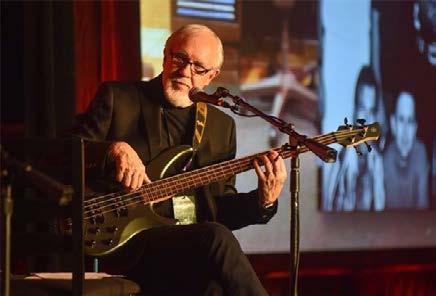
In particular, its unlikely impetus would broaden the scope of Nashville music, and help open the door to a more diverse range of artists.
continued on page 18
APRIL – JUNE 2023 17 JAN – MAR 2023 17
A native of Florence, Alabama, just across the river, Putnam inherited a gift for playing bass from his father — though the elder Putnam, Donald Gentry, had discouraged it because of his own experiences on the road and playing in Beale Street bars in Memphis. He’d even turned down the opportunity to move to Nashville professionally, eschewing that scenario in favor of selling insurance, along with homemade worm tonic for hogs and chickens in the region, taking care of his young family.
“So even when I was growing up, every now and then we’d make up some chicken and hog toddy, and he would deliver it to people around North Alabama,” Putnam said from his home in Florence, laughing. “They were still calling him. Wasn’t he the craziest damn guy in the world? And he could play the bass a little bit.”
This is a simple, but illuminating anecdote. This is country. This is music. Men and women torn about that “Christ-haunted landscape,” as Flannery O’Connor famously put it, wrestling for money, love, music, and most importantly, survival. It is the Southern recipe for fire in the belly. To understand the musical relationship between Nashville, Muscle Shoals, and Memphis, look no further.
Putnam’s father had made his own peace, and eventually bought his young son a Fender bass in 1958 so he could hold forth in local bands the Rhythm Rockets, Mark V, and Dan Penn and the Pallbearers. Throughout that embryonic evolution, Putnam was in league with piano and keys player David Briggs, his closest friend, and drummer Jerry Carrigan. The three moved through rockabilly, Elvis, rock & roll, and blue-eyed soul, feeding gymnasiums and countless fraternity dance parties across the state, under the managerial guidance of Carrigan’s father, Larry.
Such is the well-documented and fundamental origin of the Muscle Shoals Rhythm Section. The cadre formed a relationship with the manager of the Princess Theater in Florence, Tom Stafford, who envisioned a potential music scene there, and had fashioned a rudimentary recording space for demos above the Corner Drug Store, owned by Stafford’s father, a pharmacist. Stafford Publishing and Recording (SPAR) was born and the pay was free movies and an ample supply of codeine cough syrup.
Songwriters and musicians Dan Penn, Spooner Oldham, Donnie Fritts, Billy Sherrill, Rick Hall, Terry Thompson, and one otherworldly singer Arthur Alexander, were among future heavyweights who would visit SPAR.
“The thing that changed everything was the day Arthur Alexander showed upstairs at the drug store,” Putnam said. “The Muscle Shoals recording scene would not have happened without Arthur.” And, though Putnam would find himself in Nashville helping to bolster studio rhythm sections just a few scant years later, he had no clue that what he was doing in Alabama in the late-1950s and early 1960s could possibly inform the music and the scene in country music’s capital. The thought would have been an alien concept.
It was Rick Hall’s ability to find money and space for Florence Alabama Music Enterprises (FAME) that created the environment for Putnam and his mates to break through professionally. FAME was founded in 1959 by Hall, Sherrill, and Stafford, with sole ownership going to Hall in 1960.
“When we started out down here, Rick Hall having enough money to produce a single with Arthur Alexander was the moment,” Putnam said. “I have to give Rick a lot of credit because he came in and heard some demos we did with Arthur at SPAR, and he knew he wanted to produce Arthur. He wanted to build a real studio. He found some warehouse space, just in a row of buildings that Henry Ford built, and he cleaned it up and built a little control room on the site himself.
“We went over there and Rick had a four-channel mixer, and he played bass in a band with Terry Thompson. Terry was the greatest guitar player in Muscle Shoals. He was an old guy — might have been twenty-four. Carrigan is seventeen, I’m eighteen, and Briggs is eighteen.
“I want to tell you about Rick Hall. He had good ears. He became a good engineer, but we'd go out there and play twenty times, thirty times, take a break and he’s saying, ‘I still don't have it.’ We only did three songs with Arthur, and he’s on one side singing and on the other side, there's Peanutt Montgomery [the other member of Hall’s original rhythm section] standing on some Coca-Cola crates to get his guitar up, even with the other side of the mic, and Rick would move him back and move him back until he had a balance on the vocal and the guitar. It’s four mics. And, I’ll tell you, if you listen to the original recording of ‘You Better Move On,’ it’s well-balanced, it's a good mix. It wasn’t easy to do.”
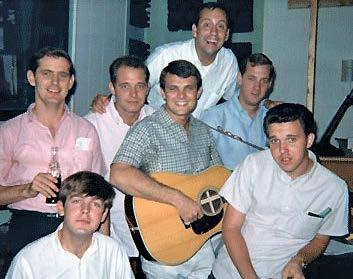
18 THE NASHVILLE MUSICIAN
Wrestling for money, love, music, and most importantly, survival. It is the Southern recipe for FIRE IN THE BELLY. To understand the MUSICAL RELATIONSHIP between Nashville, Muscle Shoals, and Memphis, look no further.
The original Muscle Shoals rhythm section at a FAME Studio session in 1963 for Tommy Roe (center with guitar): (Clockwise from bottom right): bassist Norbert Putnam, drummer Jerry Carrigan, studio owner Rick Hall, producer Felton Jarvis, arranger Ray Stevens and pianist David Briggs.
“You Better Move On” was released on Dot Records late in 1961 after Hall came to Nashville and shopped the three sides around. That same year he moved the studio to its current location in Muscle Shoals. He and Sherrill had gotten to know Owen Bradley and Chet Atkins from earlier forays into Music City, and though they listened to his three tracks, they both said they had no money to promote a pop or R&B record. He was turned down on every Nashville front for the same reason, with the lone exception of Dot, located in Gallatin. Dot had connections to WLAC radio in town, one of the most powerful R&B platforms in the U.S. The release of the record, along with the B-side “A Shot of Rhythm and Blues,” written by Thompson, was a watershed moment for the Muscle Shoals scene, and began the ticking clock for Putnam, Briggs, and Carrigan. They would bring their musicianship, and rocking R&B sensibilities, north to Nashville in 1965.
“So, one other thing happens,” Putnam said. “Dot distributed to England, and George Harrison tells me this story later. Brian Epstein ran to the record shop and the band began to listen to the 45. George said that John Lennon went absolutely nuts. He was singing it all day and night, but he couldn’t quite get it right. Paul liked the B-side and they figured quickly that they could play that one in the club scene. I think John showed it to Jagger. It was the first international hit song from Muscle Shoals.”
The Rolling Stones released their cover of “You Better Move On” in 1964, and the Beatles went on to record “A Shot of Rhythm and Blues” three times for the BBC. FAME was on the map. Putnam soon found himself on hit records by Jimmy Hughes with “Steal Away,” the Tams with “What Kind of Fool Do You Think I Am,” with Joe Tex on “Hold On to What You’ve Got,” and on several with Tommy Roe, who would secure a spot for them to back himself, the Righteous Brothers, and four other opening acts in Washington, D.C. on February 11, 1964, for the Beatles at their first American show.
It was life-changing for Putnam. He and Briggs decided to stay over that night, defying Hall’s edict that they all return on the midnight flight so they could be in the studio for work the next day. And, though they weren’t big fans of the Beatles, something clicked during
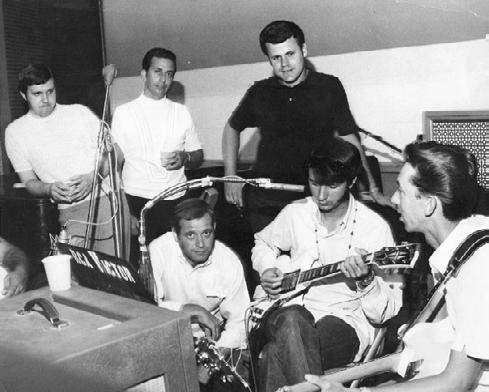
their show that made them think more broadly. Unfortunately, their invitation to the after-party had been discarded, and they did not attend at the British Embassy.
“We thought Rick could fire us, but there weren’t many others waiting in the wings,” Putnam said. “It would be a few years before David Hood and those guys would start. We hadn’t met the Beatles at soundcheck because we were so hungry.
“David and I navigated our way up to the stage before they came out. And, when they hit the first chord, it was overwhelming. I was about ten feet from McCartney’s bass amp and they got the Voxes. His bass amp was five feet tall. He played at double the level I just played earlier, and it was emotional. God, they stood up there and screamed their little hearts out. David looked at me and said, ‘We underestimated these guys. They’re better.’
“And on the way back, we talked and he said, ‘You know what? Maybe it's time.’ It was time for us to make a move. We had been approached about coming up to Nashville before. Bob Beckham had been coming down to Muscle Shoals and we thought he would give us some work. Ray Stevens had said he thought we could get the Monument work because Fred [Foster] and Bobby Moore had a falling out. It was starting to make sense.”
On a particular trip Stevens made down to FAME in 1965, he took the three to dinner to pitch them on the idea of moving to Tennessee. He noted it was getting more difficult with the A Team as they were getting older, and the amount of work was growing. Even with the known opportunities, the three were somewhat skeptical of just picking up and taking the risk — until Stevens made the point about money.
“He told us if we could get our reading together, we’d have success,” Putnam said. “He said, ‘You play the young music with a lot of feel. Do you have any idea how much money you’d be making if we were doing these sessions in Nashville?’ I think the scale had moved up to $50, and he said if we found a groove there we could make $200 in a day with four sessions. That’s $1000 a week. I’d made $10,000 for the whole previous year. That’s more money than God makes!”
They were sold, and Putnam soon found himself in Nashville, hanging on for dear life. He did find work with Monument almost immediately. Jerry Bradley arranged for them to share a two-bedroom apartment on 17th Avenue.
APRIL – JUNE 2023 19 continued on page 20
“You play the young music with a lot of feel. Do you have any idea HOW MUCH MONEY you’d be making if we were doing these sessions IN NASHVILLE? ”
1968 session for Michael Nesmith and the Monkees at RCA studio A in Nashville, for the song “Listen to the Band.” Pictured from the left, standing, Norbert Putnam, Lloyd Green, and Kenny Buttrey. Kneeling, producer Felton Jarvis, seated (l-r) Nesmith, Wayne Moss.
“We weren’t listening to the Opry back home,” he said. “But, we were listening to the Everly Brothers, and Connie Francis came down and did hits there. One of my favorites was Gene Vincent. Elvis. I didn’t know, though, if I would be very good at country music because I didn’t really listen to the bluegrass guys and that sort of thing. I spent my time studying the West Coast bass players.
“So, when we came to Nashville as players it was really scary. We were hired for Robert Knight’s record ‘Everlasting Love’ [written by Mac Gayden and Buzz Cason], and ‘She Shot a Hole in My Soul.’ We did those two records. Buzz was country, but Mac was R&B, so we made ‘Everlasting Love’ more of an R&B song like the rhythm and melody Mac had worked out. I practiced and practiced on it with Mac, and he was on guitar along with Charlie McCoy, and Kenny Buttrey was the drummer. It was a big deal. John R [John Richbourg] had started using us for some stuff, and some of the Black music from WLAC filtered down, but it was big when Fred Foster brought us in. We did all the Monument work for a while.”
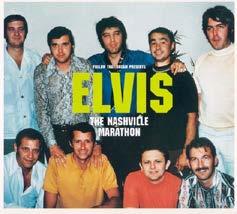
Nashville was surely a learning curve for Putnam, but the timing was right. He found himself at sessions for everyone from Dolly Parton, who was recording Petula Clark’s hit “Downtown” at the old Masonic Temple studio for Foster, to Loretta Lynn for Owen Bradley, to steady work of demo sessions for Jerry Bradley, old champion Bob Beckham, and Fred Rose. Those demo sessions soon led to calls for master sessions.
Putnam recalled Owen Bradley’s logic when it came to his bass.
“He said his No. 1 guy was Bobby Moore,” Putnam said. “He can do everything from pop to country. His No. 2 guy is the greatest country bassist in Nashville, Junior Huskey. Huskey would do Loretta and all that stuff because he’s at the Opry and knows all the songs, but I would get called because he does an album from 10 a.m.-1 p.m. and 2-5 p.m. on Monday, and 10 a.m.-1 p.m. on Tuesday. We mastered on Wednesday. There was no mix. It was mixed live. That’s something you should really think about when you hear a Brenda Lee record — the engineer had to mix that live and the balances were great.”
And, there were other, greater forces at work. The thing that Putnam had worried about as his greatest liability — that of being an R&B or rock & roll player in a country world — was actually his greatest strength in Nashville. Harold Bradley, one of the greatest bass players on record and longtime head of the union, told him about the dinner parties at Frances Preston’s home that she would
host maybe four times a year. Preston, of course, became the head of BMI, was a long-serving member on the CMA board, and would become a member of the Country Music Hall of Fame.
“Harold told me Owen and Chet, and many of country’s top producers were always there,” Putnam said. “Wesley Rose and Bob Beckham would be there. At the end of those dinners, the conversation would always turn to the subject of how to broaden the scope of Nashville’s music.
“He said Ray [Stevens] would always come back from Muscle Shoals and was very big on us. We were on the radar and in their thoughts. When they decided we were ready to come up, we were on the Acuff-Rose account, the Combine account — every one of those demos came across Chet’s desk or Owen’s desk, and they would watch our progress. They thought we could make it and they put us in the demo routine to see if we got better, and we did. These ‘founders’ thought to make the music broad, not narrow.”
Country music journalist David Cantwell has stated that the infusion of the original Muscle Shoals Rhythm Section into the body of country music changed the sound fundamentally, injecting an R&B / country soul sensibility into the mix that broadened its appeal.
“I believe that is absolutely true,” Putnam said. “I understand that, and it changed, but I changed, too. Nashville was changing. My bass lines were predicated on James Jamerson, Paul McCartney, Tommy Cogbill from Memphis — the greatest Southern bass player that ever lived. I stole from Tommy constantly. Norbert Putnam became an amalgamation of Buster Williams in California and the others I would study. Nelson Riddle’s guys. I don't know why I thought I needed to know how to do pop, except it was so much fun to play on that acoustic bass.
“And when we got on those sessions, we played more progressively. Burt Bacharach wrote great bass lines, and I studied every damn one of them. When I listen now to Bobby Goldsboro’s ‘Honey,’ the part I’m playing sounds like something that Bacharach would’ve written. I stayed on the note. I didn't go to the fifth. I would play the tonic all the way through. Every now and then I would add a little something as a modulation. We were all bringing in the stuff we loved. We loved New Orleans — jazz guys basically, and they're doing Fats Domino. The bass player came through. I saw Fats in Sheffield [Alabama] and the bass player set up right beside Fats and he’s got a pickup on his bass up front. I thought it was the coolest. We were trying to do all that stuff.”
Eventually, Putnam would play on more than 9,000 tracks, recording most often and famously with Elvis Presley, and a wildly diverse list of country and pop stars, including Willie Nelson, Dolly, Waylon Jennings, Dottie West, Ray Charles, Roy Orbison, Tony Joe White, Michael Nesmith, Goldsboro, the Vogues, Linda Ronstadt, Kris Kristofferson, and so many others. He was a member of Area Code 615, the acclaimed and influential country-rock band of Nashville Cats that included
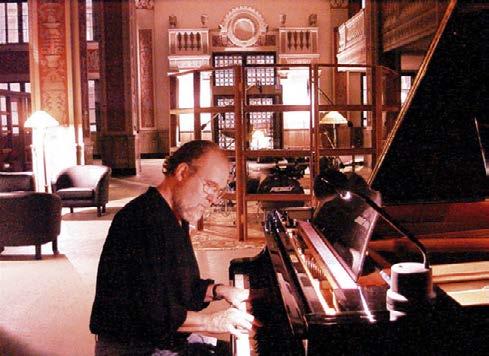
20 THE NASHVILLE MUSICIAN
Top Row: David Briggs, Norbert Putnam, Elvis, Al Pachuki, Jerry Carrigan.
Bottom Row: Producer Felton Jarvis, Chip Young, Charlie McCoy, James Burton.
Mac Gayden, Briggs, Charlie McCoy, Bobby Thompson, Wayne Moss, Weldon Myrick, Buddy Spicher, and Ken Lauber.
Of course, Putnam would ultimately move into broader environs and evolve into a different musical life altogether, co-founding Quadrafonic Sound Studios with Briggs in 1970, and producing artists that would that would help knock the doors down as the city became a recording destination for everyone from Bob Dylan to Neil Young, to Joan Baez, and beyond.
Putnam produced many acclaimed albums, including Blessed Are for Baez, which included her biggest hit single “The Night They Drove Old Dixie Down,” Dan Fogelberg’s Home Free, Nether Lands, and Phoenix, Jimmy Buffet’s Son of a Son of a Sailor and the single “Margaritaville,” Eric Andersen’s Blue River, New Riders of the Purple Sage’s Adventures of Panama Red, and many, many others.
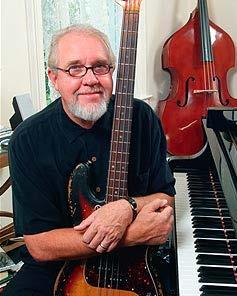

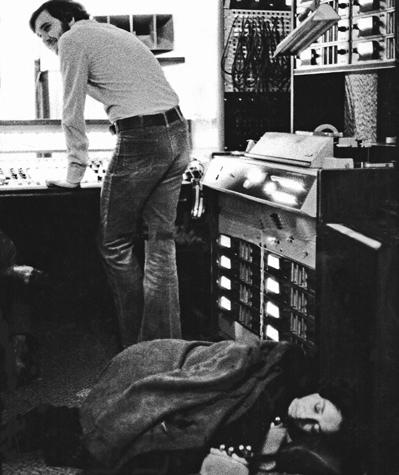
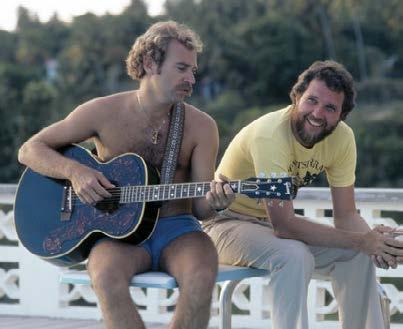
“I’ve always loved everything about Nashville, and what my move here really afforded me,” Putnam said. “It opened for me — it opened for all of us. It gave me a life in music … and one thing I’ll always say about a Nashville musician, at least what I was exposed to — a Nashville musician is in tune and in his chair by 10. I like that. No messing around.”
Norbert’s BASSES
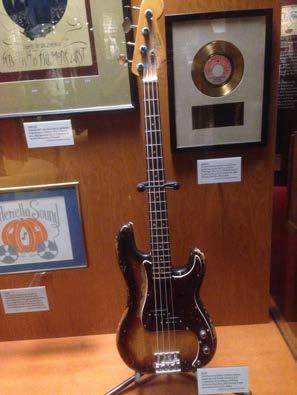
APRIL – JUNE 2023 21
TNM
Putnam would play on more than 9,000 tracks, recording most often and famously with ELVIS PRESLEY, and a wildly diverse list of country and pop stars.
Dan Fogelberg and Putnam
Putnam and Joan Baez
“My acoustic bass was a 1925 3/4 SIZE KAY. I also played a 1965 FENDER PRECISION into an Ampeg B15 amplifier. It resides in the Graceland Hall of Legends in Memphis.”
Live Review
The Jonah People: A Legacy of Struggle & Triumph
The Nashville Symphony, April 15, 2023
The Nashville Symphony is an orchestra of world-class musicians who, despite many challenges, have kept classical music performance alive and thriving in Music City during these complicated times. Among its virtues, the NSO has been at the forefront of showcasing the works of excellent contemporary American composers. Their latest collective effort is The Jonah People: A Legacy of Struggle & Triumph. The massive multimedia operatic production was composed and directed by musician, storyteller and artistic visionary Hannibal Lokumbe, and orchestrated by 257 member Jim Gray. The Jonah People is one of their most ambitious projects to date — and it came to life in four world-premiere performances from April 13 to 16 at the Schermerhorn Symphony Center. Lokumbe, an accomplished jazz trumpeter and playwright, tells the complex story of African American history in four acts, called Veils. The content is emotionally charged and pulls no punches — and the presentation is musically and visually stunning.
This unique collective effort featured the entire Nashville Symphony, plus a 100-piece choir from Tennessee and Kentucky HBCU’s, 30 actors, an African drum and dance troupe, a jazz quintet, four amazing lead vocalists, and more. The NSO was positioned downstage, made possible by the Schermerhorn’s flexible motorized
This unique collective effort featured the entire Nashville Symphony, plus a 100-piece choir from Tennessee and Kentucky HBCU’s, 30 actors, an African drum and dance troupe, a jazz quintet, four amazing lead vocalists, and more.

seating system, and played wonderfully throughout. Percussion, horns and flutes come to the fore from time to time, seamlessly interfacing with the onstage action, sights and sounds. The stage had multiple video screens on the back and sides, with changing graphics and animation, which added to the surreal visuals. Dancers, actors, musicians and singers came and went seamlessly as the show went on.
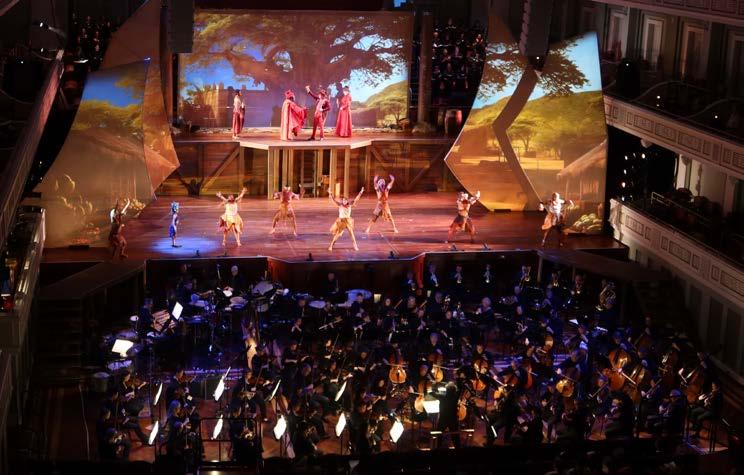
The opera’s first three Veils trace the journey and evolution of the Jonah People, aka those who were kidnapped in Africa and brought to America against their will. The abomination of slavery as a part of American history is addressed in an even-handed way as possible without watering anything down. The auction of slaves and separation of families is a heartbreaking reality, and the sequences addressing these historical realities are dramatic and emotional. The four primary vocalists are outstanding, and their passion and emotion is very moving. The NSO perfectly compliment their vocals, and their depth of commitment to the performance of Lokumbe’s work is tangible.
The final act, The New Being, features a scene with a jazz quintet led by Lokumbe that includes Local 257 mem-
ber Jovan Quallo on saxophone. It is set in the 1950s in the legendary Harlem jazz club Minton’s, and celebrates the innovations and enduring legacy of jazz musicians on American culture. Throughout, the beautiful sounds of the Nashville Symphony musicians rise to the occasion again and again to give this powerful story its wings. The ending sequence, appropriately titled Healing, was powerful and uplifting. This was certainly an ambitious undertaking on the part of the Nashville Symphony, and more than lived up to its advance billing. The challenging logistics of constantly shifting personnel and stage sets was handled remarkably by the crew. From beginning to end, the musical and visual panorama was immersive and stunning, and the uplifting message of courage and endurance radiated throughout the concert hall.
22 THE NASHVILLE MUSICIAN
REVIEWS
Laura Pursell
Lost In Time – A Tribute to Bill Pursell Netcom Music
Lost in Time is a beautiful musical salute to longtime AFM 257 member, pianist, arranger, and recording artist Bill Pursell, who passed in 2020 at the age of 94. This album began as a tribute to Bill’s wife of many years, Julie, who passed in 2018. After Pursell’s passing, his daughter, vocalist Laura Pursell, continued to work on this project with producer Steve Mauldin. The end result is a heartfelt musical journey celebrating one of Music City’s most talented musicians and composers. Bill Pursell was perhaps best known for his 1963 hit single “Our Winter Love,” but he also worked with Patsy Cline, Chet Atkins, Johnny Cash, and Marty Robbins, and many others over the years. He was a good man with many talents, and this album more than lives up to his high standards.

Pursell played piano on three songs, and arranged four songs, with the rest arranged by Mauldin. The excellent session musicians on the project include Pat Bergeson on rhythm guitar, Tom Hemby and Jerry Kimbrough on electric guitar, Jim Ferguson on bass, and Paul Leim on drums. Bob Marler and Jason Webb ably filled the piano chair on the rest of the album. The 18-piece string and horn ensemble includes many of Nashville’s best studio players, and was led by David Davidson and David Angell. Throughout the album all of the musicians played wonderfully, and Mauldin did a great job of pulling it all together in a way that would make Bill proud.
The album opens with “Every Love.” Sweet strings and tasty piano surround Laura Pursell’s soulful vocal, and set the uplifting tone for the whole album. The classic “Motherless Child” is given a driving gospel-tinged treatment with Pursell’s piano at the fore, and the call and response background voices provide a spooky backdrop. “Where Do You Start” is a plea for understanding of the complexities of love, with a passionate vocal
by Laura Pursell, and a beautiful arrangement by Mauldin. Patsy Cline’s “Sweet Dreams” is given a lush string and horn arrangement that takes the country classic to a whole new place.
Bill Pursell’s original composition “Lilacs (Lost in Time)” was his final studio performance, and the song, his performance, as well as Laura’s vocal and arrangement are absolutely stunning. “Angel Flying Too Close to the Ground,” is a great reinvention of the Willie Nelson hit, and demonstrates the wide range of musical ground Bill Pursell covered during his long and illustrious career. The album closes with Bill’s final composition and piano performance, “Tender Wish,” which is the perfect finish to a heartfelt and emotional album in tribute to a fine man and great musician.
— Roy Montana
Toby’sHouse
Mike Zikovich, Jeff Taylor, Jeff Lisenby
To say this album has a few surprises would be one of the understatements of all time. At first glance, the concept of an accordion trio conjures up a quick set of stereotypes, along with memories of Nashville’s late great Gerst Haus. As Toby’s House, Zikovich, Taylor, and Lisenby set out to increase the range of what could be considered accordion music, and they pulled it off big time. This album was released after Jeff Lisenby’s tragic passing from COVID-19, and his stamp is all over this project, which is dedicated to him by Zikovich and Taylor.
Kicking off with the jazz classic “Ain’t That a Kick in the Head,” this incredibly tight squeezebox trio comes out swingin’, followed by Lisenby’s dynamic arrangement of Blood, Sweat and Tears’ “Spinning Wheel.” Lisenby’s version of this big hit showcases the multi-layered sonic ability of this versatile group, aided and abetted by a rhythm section that includes Andy Reiss on guitar, Walter Hartman on drums, and John Arrucci on percussion.
This album was released after Jeff Lisenby’s tragic passing, and his stamp is all over this project, which is dedicated to him by Zikovich and Taylor.

Taylor’s “West Batavia Musette” and “Soliña” explore world rhythms, and his re-arrangement of George Shearing’s “Somewhere Over the Rainbow” is simply beautiful with three-dimensional dynamics from the trio and rhythm section. Hilarity ensues with a medley beginning with the disco version of “Beethoven’s Fifth”, which segues seamlessly into Queen’s “Bohemian Rhapsody,” which transports the listener into parts unknown with its uncanny reinterpretation of this ‘70s rock classic.
“Brandenburg Bossa” takes the listener to a Latin dance festival featuring horn-like accordion lines and sweet, gut string jazz guitar from Reiss. Taylor’s arrangement of the “Star Wars Medley” is hilarious, inspiring, and surreal all at once and is definitely one for the ages. Zikovich’s original “Zachary’s Polka,” with Jerry Krahn guesting on banjo, returns to more familiar ground but is no less engaging, and “Nice and Easy” swings gently, and the accordions take turns basking in the cool breeze. Toto’s “Africa” is one of the most unexpected song choices you could imagine for this group, but somehow once you’ve heard it, you can’t unhear it, and Lisenby’s arrangement gives that iconic song a whole new flavor. Speaking of flavor, the album closes with “Biscotti Samba,” one more trip south of the border, with all three virtuosos trading licks over the pulsating rhythm section.
It is a blessing that Toby’s House was recorded before we lost Jeff Lisenby, and his legacy lives on through this music. Thankfully, Zikovich and Taylor are carrying on with new member Joey Schmidt. You can hear this fine ensemble, with a full rhythm section, the first Tuesday of every month at the Bavarian Brewhaus at Opry Mills from 6-8:30 p.m. In the meantime, check out this album and prepare to have your mind blown.
Available on Apple Music
— Roy Montana
APRIL – JUNE 2023 23 REVIEWS
James Talley Nashville City Blues: My Journey as an American Songwriter University of Oklahoma Press

Singer-songwriter James Talley is a 47-year AFM 257 member who recorded four critically acclaimed albums for Capitol Records in the 1970s, and performed at the White House for President Jimmy Carter’s inauguration. His music blends folk, blues, and country forms with poetic imagery and historical tales from the American Southwest, and he has been called the Godfather of Americana Music. Nashville City Blues is Talley’s autobiography, and it chronicles his unique journey from Oklahoma to New Mexico to Nashville, and beyond.
Born into an Oklahoma family who traveled to the Northwest to find work, Talley always had a desire to make the world a better place. As he searched for his mission in life, he had a fascinating series of jobs, many of which involved human services work. As he began to perform shows and ponder how to write songs in the tradition of his heroes like Woody Guthrie, The Kingston Trio, and Pete Seeger, he began looking for his own voice. A chance encounter with Seeger while Talley was living in Albuquerque, New Mexico, gave him a once-in-a-lifetime chance to play his songs for one of his biggest influences. Seeger gave him validation and encouragement, and passed on the great advice to “write about what you know, and who you are, and where you have been.”
Talley moved to Nashville in the late 1960s, which needless to say, was a very different environment than the Nashville of today in many ways. He soon met his future wife, Jan, a Nashville native; they have been married more than 50 years. He supervised a rat control project for Metro Nashville and was heavily immersed in public health and welfare programs. He was an advocate for promoting African American workers into positions of authority, and was a friend and mentor to many people who had fallen on hard times. One of these was DeFord Bailey, an original star of the Grand Ole Opry, the only black performer on the Opry for years. Bailey was fired in 1941 under questionable circumstances. Talley also met B.B. King at a Nashville prison performance, and just a few years later would find himself in the studio with the blues legend, who was a guest on Talley’s album Blackjack Choir, the first time King was ever invited to record with anyone in Nashville.
Finally, after years of trying to get his music heard, and near misses at record deals with Columbia and Atlantic Records, Talley was signed to Capitol Records in 1975. He was still living hand to mouth, and unfortunately, Capitol simply did not know how to promote such a unique eclectic artist. After various changes in management and record label personnel, on the advice of his soonto-be-fired manager, Talley got out of his deal with Capitol. Unfortunately, the consequence of that decision was that Capitol put all of Talley’s catalog out of print. Talley ventured into the real estate business in order to feed his family, and music became a secondary pursuit out of necessity. He released several albums on Bear Family, a company that packages projects beautifully, but notoriously do not pay royalties to artists. Finally, he started his own label, Cimarron Records, and continues to write, perform and record new songs, including for a yet-to-be titled album that is on the way.
The life lessons James Talley learned the hard way resonate throughout Nashville City Blues, and a vivid part of his musical legacy is speaking from the heart, and not pulling any punches. Not surprisingly, he follows that path of honesty in telling his own story of his journey through some of the most volatile times in music business history, which many of us can learn from, and be inspired by.
— Roy Montana
24 THE NASHVILLE MUSICIAN REVIEWS TNM
The life lessons James Talley learned the hard way resonate throughout Nashville City Blues, and a vivid part of his musical legacy is speaking from the heart, and not pulling any punches.

 BY MELINDA WHITLEY
BY MELINDA WHITLEY
have had a few auditions recently, and I’m happy to say we’ve hired five new musicians! I’d like to welcome Daniel Parrette, who from a field of over 100 musicians, won the job and started performing with us in February as our new principal clarinetist. By the beginning of next season, we’ll welcome four new first violinists as well.
While every professional orchestra has unique systems in place for auditions, much of the process is also the same. Anyone wanting to win an audition should make sure to familiarize themselves with the specifics of each individual process and pay close attention to any differences to make their experience as smooth as possible. For example, some orchestras look carefully at resumés and only invite candidates they feel will have the best chance of success based on resumé content. This can be seen as a kindness, as travel to orchestra auditions is expensive and most musicians have to make complicated plans to miss work, spend time and their own money to attend multiple days, sometimes with more than one trip; not to mention time spent on preparation. This is cost effective to the auditioning orchestra also, due to listening to fewer candidates, saving time and money in the schedules of many employees, as well as not tying up the use of the space, costing the organization opportunities for income.
Other orchestras, like Nashville, no longer review resumés at all and invite everyone who is interested to participate in person in the full audition process. Unlike reality shows such as The Voice or America’s Got Talent, that usually means at least three rounds of competitive playing behind a screen over the course of several days de -


pending on the number of applicants for the job. The process has often been described as being similar to rounds of a sports competition, such as the Olympics, and most auditioning musicians would enthusiastically agree with that characterization.
At the NSO, our personnel managers, with the help of many dedicated volunteers, organize and run the logistical process, while our audition committee runs the artistic process until the final round of the audition. In the finals, the process belongs to the music director and it is their decision to hire someone with the approval of a majority of the audition committee. All rounds of our auditions are decided by secret ballot vote, counted by the union steward, and double-checked by our personnel managers. It takes a majority of votes to advance from one round to the next. In the NSO, we use seven or nine-member audition committees of varied composition, depending on the vacancy.
WeAnonymity is a key concept in auditions in varying degrees around the country. Ayer (2005) reports that in 2001, we found proof that using a screen in auditions made orchestras more likely to be accessible to women. Only now, after 40 years of intentional changes to the process, do we finally have a professional top-tier orchestra like the New York Philharmonic with a slight majority of musicians that are women. Adjustments in the process continue to be explored as we try to balance the opportunities for musicians from underrepresented minorities in the industry. In Nashville, we are proud to be leaders in this effort, and use a screen in all rounds for completely blind auditions.
We’ve even considered the affect the screen might have on our audition candidates, so we put our screen out in the hall for the audition committee to sit behind. This allows our candidates to fully experience the acoustics of the concert hall instead of feeling swallowed up by a big fabric drape right in front of them eating their sound. We carpet the path onto the stage for the candidates so we hear no clues about their identity from the sound of their shoes on the stage. We have a proctor on the stage, out of the way of course, in case a candidate has a question during the process, as we cannot allow a candidate to speak directly to the committee at any time. In early rounds of the audition, the proctor is a musician in the orchestra, making it easier to answer questions from the candidates if needed. In the final round, the personnel manager is the proctor. This safeguards the anonymity of the process even further.
I’ve included some pictures here so you can see the set up I’ve described in our hall. That’s the table for the onstage proctor by the door in the second picture (2). The chair is for the comfort of the candidate and is not required to be used. The third picture (3) is from my position as union steward behind the curtain with an audition committee. I sit at the rearmost position, making sure that no one on the audition committee can see who is on the stage. It’s even part of my job to check the curtain for gaps before each day/round of the audition.
I hope this helps answer some questions about our audition process here in Nashville, and that you’ll understand a bit more of what each musician in the orchestra has had to do to join us.
For more information on the developments in audition procedures in American Orchestras, I recommend Ayer, J. (2005). More than meets the ear: How symphony musicians made Labor history. Syren Book Co.

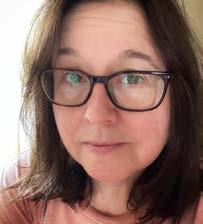
26 THE NASHVILLE MUSICIAN
SYMPHONY NOTES
TNM 1 2 3
It’s
festival time again, and it appears that the music scene for jazz and blues has finally returned to some resemblance of its former self. We welcomed new venues and new music projects but recently had to say goodbye to some well-known talents; like ubiquitous Nashville bassist Michael Rhodes, English jazz great Tony Coe, legendary rock drummer Jim Gordon, multi-instrumental master David Lindley, and modern jazz legend Wayne Shorter.
Festivals
A short drive east gets you to this year’s Watertown Jazz Festival July 15. An excellent program features Dixieland with Jerry Krahn, the Pat Coil Quartet, two master trombonists: John Fedchock and Bob McChesney, vocalist Monica Ramey, three big bands, including the Nashville Jazz Orchestra, and guitar legend Larry Carlton. For full schedule go to watertownmusicandarts.com/performers/
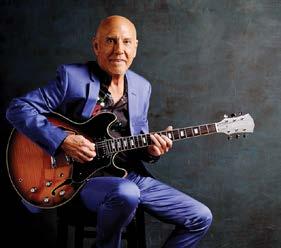
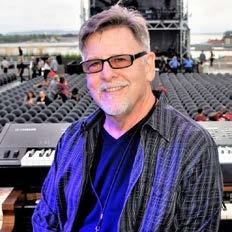

This summer the Jefferson Street Jazz and Blues Festival can be found on the Fisk University campus July 22. Produced by JUMP, artist lineup is TBA. Listen for announcements on WFSK 88.1FM, and for more info, go to nashvillejazzandbluesfest.com/ Beachaven Vineyards & Winery south of Clarksville now offers full summer weekends of music. Jazz on the Lawn is the last Saturday of every month with two bands on the big stage, one 3-5 p.m. and one 6:30-9:30 p.m. The courtyard offers a variety of artists every Friday and Saturday from 4-7 p.m. and Sundays from 2-5 p.m. Food trucks all three days. Go to beachavenwinery.com
In the Nolensville area, Arrington Vineyards’ Music in the Vines is another great place to spend a weekend afternoon. Enjoy jazz outdoors or bluegrass indoors every Saturday and Sunday from 3 — 7 p.m. Food available from Simply Living Life. For artist schedule and menu, go to arringtonvineyards.com. A great way to look for summer festivals is the 2023 Tennessee Festival Guide at festivalguidesandreviews.com/tennessee-festivals/
Clubs and Concerts
Analog at Hutton Hotel on West End combines stylish decor, an intimate feel, state of the art production, and a creative bar. For funky jazz, check out Italian guitarist Giacomo Turra Saturday, May 13. For classic jazz, there’s Harlem Night on Friday, May 26. Vocalist Sheri Hauck presents a tribute to her jazz-singing mom, Jessie Hauck, with a night of standards. For details, go to analognashville.com
After an absence of nine years the Preservation Hall Jazz Band, a New Orleans tradition, returns to play Schermerhorn Symphony Center May 21. Stick around to dig some blues with At Last - A Tribute to Etta James featuring vocalist Crystal Monee Hall May 24. Two concerts remain in the 24th sea-
BY AUSTIN BEALMEAR
son of Jazz on the Triangle at Church of the Holy Trinity on 6th Ave. Pianist Thomas Cain is on May 19, vocalist Paula James Chavis is June 16.
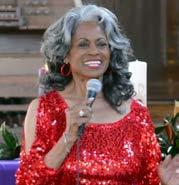
The Nashville Jazz Workshop offers a full summer of classes and concerts. May 13: Vail Johnson and the Fusion Kings, May 25: flutist Ashley Crawford, and July 1: the Sofia Goodman Group. JazzAM for kids features the music of Billie Holiday May 13 and Nat King Cole June 10, Saturdays at 10 a.m. Info at nashvillejazz.org . Ace drummer Goodman also brings her group to Dogwood Park in Cookeville July 20.
Chicago sound-alike Leonid & Friends plays 3rd & Lindsley May 19. For jazzers, master vocalist Kurt Elling brings a show called Superblue featuring guitar marvel Charlie Hunter May 25. Get jazz and roots together with The Bad Plus and guitarist Marc Ribot’s Ceramic Dog June 14. Want more guitar? How about A Nashville Night Honoring Jeff Beck, scheduled for June 23. 3rdandlindsley.com Still more guitar (with vocals) at City Winery with the John Pizzarelli Trio June 7.
Recordings
The latest by saxophonist Don Aliquo is Growth on Ear Up Records, 2022. Beautiful exploratory music also features trumpeter Rod McGaha and guitarist Steve Kovalcheck. Look for Aliquo’s duo album, Live at Hinton Hall (The Innocence of Spring) 2019. He plays Rudy’s several times a month, go to rudysjazzroom.com.

Sofia Goodman’s debut album Myriad of Flowers was released in 2018 and nominated by The Nashville Music Industry Awards for Best Jazz album of 2019. thesofiagoodmangroup.com. A classic that I missed several issues ago is Where’s Eli by Nashville Jazz Machine on AM-PM Records (or Trend/Discovery) 1985; features George Tidwell’s wonderful “Palookaville” and definitely worth the search.
See you out there. Bring your guitar, we’ll jam.
APRIL – JUNE 2023 27
JAZZ & BLUES BEAT
TNM
Loretta Lynn
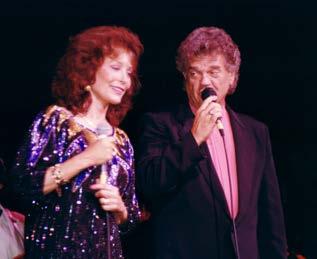
April 14, 1932 – Oct. 4, 2022
he iconic and beloved artist Loretta Lynn, 90, died Oct. 4, 2022, after a career that spanned six impactful decades and left an indelible mark on the culture of country music, as well as other genres, and society itself.
Lynn was born April 14, 1932, in Butcher Hollow, Kentucky, to Ted and Clara Butcher Webb, and was the second of eight children. “Mommy never had no doctor when she had a baby,” Lynn wrote in a 2007 essay. “She’d send me and the kids to Grandpa’s, and I’d go back home, and there’d be a baby there.”
As a youngster Lynn sang at church and other social events. Shortly before her 16th birthday in 1948, she married Oliver Vanetta “Dolittle” Lynn, and the couple moved to Washington state. Lynn had four of her six children before she turned 19, but she also found time to play the Harmony guitar her husband had purchased for her in 1953. The fledgling musician taught herself to play, and her first attempts at songwriting came soon after. A few years later she
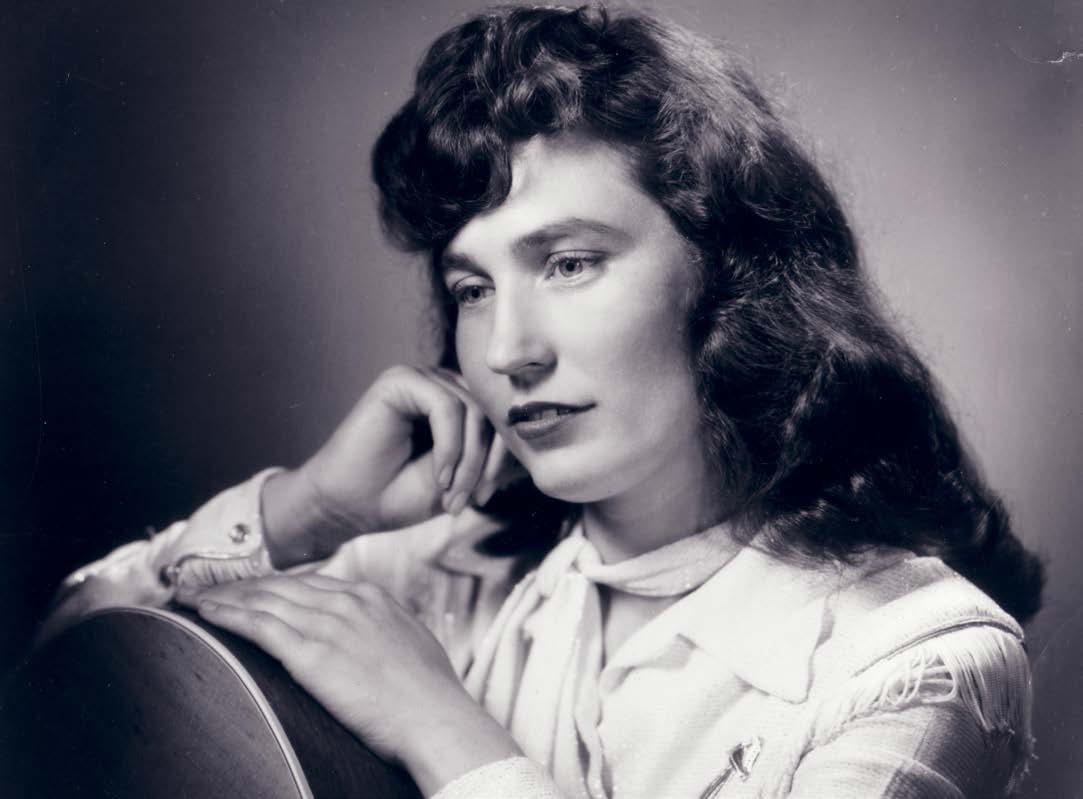
had started a band, The Trailblazers, which played at area taverns.
Lynn won a televised talent contest hosted by Buck Owens in Tacoma, Washington, in 1959. The program was seen by Norm Burley, a Canadian who soon after
tactic paid off, and by the time the couple reached Nashville, the tune had climbed to No. 14 on the Billboard chart. Lynn began recording demos for the Wilburn Brothers Publishing Company, which led to a contract with Decca Records. She already had a fan club by the end of 1960.
formed a record company called Zero. By 1960 Lynn had recorded her first songs for the label in Los Angeles. Among the four was her composition “I’m A Honky Tonk Girl.” Lynn and her husband took an active role in the promotion of the record. They drove across country to visit radio stations and make their pitch in person. The
The ‘60s saw a series of hits for Lynn on Decca, including her first single, “Success,” followed by “Before I’m Over You,” and “Wine, Women, and Song.” More hits came from three duet albums with Ernest Tubb and more solo releases like “Blue Kentucky Girl,” and “The Home You’re Tearing Down.” In 1966 Lynn cracked the Top 10 with her own tune “Uncle Sam,” about the human cost of the Vietnam War. Her composition “You Ain’t Woman Enough” was an instant smash that year. In 1967 she scored again with “Don’t Come Home A-Drinkin’ (With Lovin’ on Your Mind.) The title track from the album Fist City was Lynn’s second charttopper that year.
Lynn continued her string of No. 1 records in the 1970s, first with “Coal Miner’s Daughter,” which later served as both the
28 THE NASHVILLE MUSICIAN FINAL NOTES
title of her 1976 biography and the 1980 Oscar-winning film of her life. She started a partnership with Conway Twitty in 1971 after a very successful appearance together in Britain. The duo had multiple industry awards and five consecutive No. 1 records from 1971-75 including the Grammy-winning “After the Fire is Gone.” As a solo artist Lynn received her fifth No. 1 — “One On the Way,” in 1971 — and also charted with “You’re Lookin’ At Country,” and “Here I Am Again” (1972). That year she became the first female country singer to appear on the cover of Newsweek, and was also the first female to win CMA Entertainer of the Year.
Lynn’s enormous success as both a singer and a songwriter was a testament to not only her obvious talent, but also her forthright personality, zeal for fans and live perfomances. Her unabashed writing style never hesitated to dive into new territory that would make many country artists hesitate. Over the decades she spoke to society at large, but often directly to the blue-collar housewife — and shone a light on the burdens they carried, while also bringing hope and heartfelt empathy for their battles. Songs like “Rated X,” and “The Pill,” among many others, took on both the rapidly-changing world, and the double standards women had dealt with for generations. Country radio often refused to play her songs, and in a 1987 interview Lynn said she had eight songs that were banned by stations.
In 1977 Lynn released I Remember Patsy dedicated to the memory of her friend Patsy Cline. She took one of the songs on that album to No. 1 for the second time — first for Cline in 1962, and then for Lynn in 1977. More Top 5 hits followed, and Lynn would get her last No. 1 in 1978 with “Out of My Head and Into My Bed.”
In 1980 Lynn personally chose Sissy Spacek to play her in the movie Coal Miner’s Daughter, which became a No. 1 box office success. Tommy Lee Jones played Lynn’s husband in the acclaimed film that drew an even larger audience to become acquainted with the special talent of Loretta Lynn. The ‘80s brought more solo releases and hits, including “Pregnant Again,” and “Naked In the Rain.” In 1987 she sang on a track with k.d lang, Brenda Lee, and Kitty Wells for lang’s Shadowland album. “Honky Tonk Angels Medley” went on to gold certification, and a Grammy nomination. In 1988 Lynn became a member of the Country Music Hall of Fame.

Lynn sang on the hit album, Honky Tonk Angels, with Dolly Parton and Tammy Wynette in 1993. In 2000 she recorded her first album in seven years, which contained “I Can’t Hear the Music,” a tribute to her late husband, who had died in 1996. Another biography came out in 2002, Still Woman Enough, which became her second
Lynn’s
New York Times bestseller. Lynn published a cookbook, You’re Cookin’ It Country, in 2004. She was never shy to expand her boundaries, and in 2004 also worked with alternative music producer Jack White for the album Van Lear Rose, on which she wrote or cowrote every song. Lynn and White received five Grammy nominations for the project, and won two of them. The album Full Circle broke the Top 20 on Billboard in 2016 and was nominated for a Grammy. The same year Lynn released White Christmas Blue. Lynn’s 50th studio album, Wouldn’t It Be Great, was released in 2021.
Over the course of her career Lynn wrote over 160 songs and released 60 albums. She performed at the White House five times, and was a longtime friend of Jimmy
Carter. She had 10 No. 1 albums and 16 No. 1 singles. She remains the most awarded woman in country music history. A few of her honors include three Grammys and a Grammy Lifetime Achievement award, eight CMA awards, 13 ACM awards, and 60-year membership in the Grand Ole Opry. She was a 2008 inductee to the Songwriters Hall of Fame, a Kennedy Center Honoree, and a recipient of the Presidential Medal of Freedom in 2013. CMT named her Artist of a Lifetime in 2018.
Drummer Eric Kaberle worked with Lynn for 20 years, and shared some stories from the road.
“I remember I called Loretta ‘boss’ one time shortly after I started with her. She snapped back ‘Don’t call me that. We’re all the same out here.’ She couldn’t help but be down to Earth! After the first three songs, Loretta would ask the crowd, ‘whatda-y’all wanna hear?’ The crowd would proceed to yell out song titles and she’d say, ‘Alright. Hit it!’ That kept us on our toes!
Lynn was named to the Women Songwriters Hall of Fame in 2022.
Lynn was preceded in death by one son, Jack; one daughter, Betty Sue, and four brothers, Melvin, Herman, Jay, and Donald Webb. Survivors include three daughters, Cissy, Peggy, and Patsy; one son, Ernest; three sisters, Betty Ruth Hopkins, Peggy Sue Wright, and Crystal Gayle; and more than 20 grandchildren.
A public memorial service and celebration of life was held Oct. 30, 2022, at the Grand Ole Opry House in Nashville.
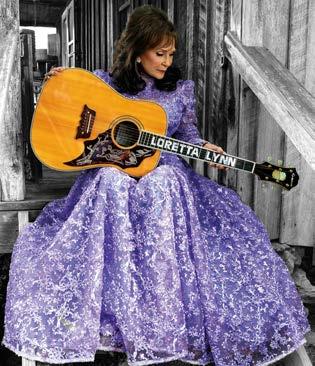
APRIL – JUNE 2023 29 FINAL NOTES continued on page 30
enormous success as both a singer and a songwriter was a testament to not only her obvious talent, but also her forthright personality, zeal for fans and live perfomances.
Lynn with Sissy Spacek
continued from page 29
Anita Kerr
After work with a wide range of stars from the Smothers Brothers to Rod McKuen, she moved to Switzerland in 1970, and launched a third version of the Singers in London, where she continued to record and produce, as well as arrange for Hal Leonard Publishing. She and her husband opened the renowned Mountain Recording Studio in Montreux.
In 1975 ASCAP honored Kerr for her contributions to the development of the Nashville Sound, and in 1992 the Recording Academy gave her the Governors Award for her outstanding contribution to American Music.
Survivors include her husband; two daughters; five grandchildren; and two great- granddaughters.
Vocalist, arranger, composer, bandleader and producer Anita Kerr, 94, died Oct. 10, 2022. Her legendary Grammy-winning quartet sang on a multitude of recording sessions in the ‘50s and ’60, and the group’s lush arrangements were an integral part of what became known as the Nashville Sound. The prolific artist was a 30year member of the Nashville Musicians Association who joined the local Jan. 1, 1992.
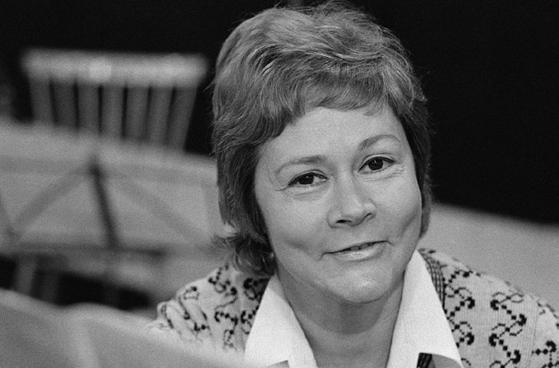
She was born Anita Grilli on Oct. 13, 1927, in Memphis, Tennessee, to William and Sofia (Polonara) Grilli. Her father owned a grocery store, and her mother was a homemaker, but also a contralto. Kerr studied piano and organ, and was working as a staff musician for a local radio station at age 15. She had also already started writing arrangements for local dance bands. Her mother hosted a radio program and Kerr performed on the show as a child — by the time she was in high school she had her first trio. She married DJ Al Kerr in 1947, and the couple moved to Nashville. Before long, a vocal quintet she organized got the attention of a WSM program director who hired her as an arranger. Soon after she was noticed by producer Owen Bradley who signed the group to Decca Records in 1951. The Anita Kerr Singers also worked as backup vocalists for artists like Eddy Arnold, Burl Ives, Ernest Tubb, and many more.
By the ‘60s practically every song cut in Nashville had either the Anita Kerr Singers or the Jordanaires singing backup. Just a few of the artists who recorded with the Anita Kerr Singers include Hank Snow, Brenda Lee, Perry Como, Pat Boone, Rosemary Clooney, Bobby Vinton, Roy Orbison, Willie Nelson, Floyd Cramer, Al Hirt, Ann-Margret. Country Music Hall of Famer Charlie McCoy worked with Kerr in the studio on many occasions, and talked about the experience.
“Anita was multi-talented, and she had her group almost reading her mind. She never had to suggest harmony part to them. They instinctively knew what she was thinking.”
After her divorce from Kerr in the mid-60s she moved to Los Angeles, where she continued to arrange and record in other genres, including pop, jazz, and orchestral music. She reformed her singers and in 1965 the album We Dig Mancini won a Grammy for Best Performance by a Vocal Group. She also composed and recorded numerous jingles for use by various radio stations. Kerr married Alex Grob in 1965. The Anita Kerr Singers won another Grammy Award in 1966 for their recording of “A Man and a Woman”, released as a single on Warner Bros. Records.
Jerry Whitehurst
May 12, 1938 – Oct. 30, 2022
Pianist, composer, and musical director Jerry Whitehurst, 84, died Oct. 30, 2022. His long list of credits stretches over his sixdecade career, and includes his work on classic shows such as Grand Ole Opry, Hee Haw, The Morning Show on WSMV and Nashville Now, as well as many recording projects. Whitehurst was a life member of the Nashville Musicians Association who joined Local 257 February 10, 1962.
The Nashville native was born May 12, 1938, to the late Earl and Geraldine Knott Whitehurst. He was working for a trucking firm in his early 20s when he got a gig playing piano part-time at the Opry in 1961. He soon became a staff pianist for WSM radio and TV, including WSM’s Bobby Lord Show on syndicated TV, and was in the house band when Hee Haw launched in 1969. As a longtime friend of Ralph Emery, he was a natural choice to become the musical director of Nashville Now. He also composed the theme song for the program.
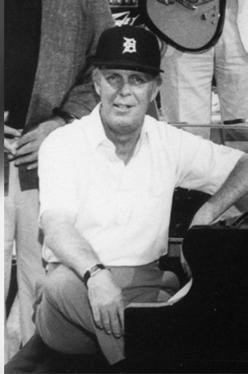
Whitehurst was so in demand that, according to the Country Music Hall of Fame and Museum, he was making 500 television appearances a year by the late ‘80s. Whitehurst and the Nashville Now band won the Academy of Country Music’s Non-Touring Band of the Year award five years in a row, from 1985 to 1989.
Guitarist Fred Newell, who worked with Whitehurst on Nashville Now, talked about his friendship with Whitehurst.
“Those who worked for Jerry Whitehurst, know how he always looked out for musicians. He was a great musician, bandleader, and a dear friend to me. I miss him,” Newell said.
Whitehurst worked on a host of albums for artists that include Johnny Paycheck, Johnny Cash, Pat Boone, Lester Flatt, Ernest Tubb, Dolly Parton, Porter Wagoner, and many more, but live performance
30 THE NASHVILLE MUSICIAN FINAL NOTES
was what he enjoyed the most. In an interview Whitehurst said “I had much rather do live performances. That’s why I enjoy our daily TV shows so much. There’s a feeling a musician gets from a live audience that you don’t find while taping a show.”
Survivors include his wife, Linda Mealer Whitehurst; two daughters, Terry Dugger and Lisa Hall; one son, Gary Whitehurst; three stepchildren, Jamie Gentry, Julie Tankersley, and Jennifer Smith; two sisters, Brenda Gregory and Connie Baker; one brother, Byron Whitehurst; twelve grandchildren, and three great-grandchildren.
Funeral services were held Nov. 4 at the Woodbine Funeral Home. Interment followed at the Mount Olivet Cemetery. The family requests that donations be made to Faith Independent Church in Nashville, the Shriner’s Hospital for Children in Tampa, Florida, or to St. Jude Children’s Hospital in Memphis.
CHARLES “CHUCK” FLYNN
Oct. 5, 1935 – Oct. 13, 2022
Bassist Charles “Chuck” Flynn, 87, died Oct. 13, 2022. He played bass for Loretta Lynn in the ‘70s and ‘80s and was a life member of the Nashville Musicians Association who joined Local 257 May 30, 1974. He was born Oct. 5, 1935, in Mt. Vernon, Ohio, to the late Robert J. and Viola Hissong Flynn. He graduated from St. Vincent de Paul Catholic School in 1954, and his first profession was pattern maker for Cooper Bessemer. He then became a home builder for Dawson Construction Company. But he dreamed of working as a professional musician, and in the mid-‘70s became a member of Lynn’s band. Flynn traveled widely with the band, both domestically and internationally, and appeared in the critically acclaimed movie about Lynn’s life, Coal Miner’s Daughter. After he retired from the road, he opened a music store — Flynn’s Guitar.
Flynn married Barbara A. Thatcher in 1957, at Saint Vincent de Paul Catholic Church, where he was a member throughout his life. Family said that in addition to music, Flynn loved fishing, boating, mushroom hunting, visiting casinos, and most of all, telling jokes.
Charles was preceded in death by his parents; two sisters, Carol Todd, and Patrice Rioux; one brother, James Flynn; one grandson; and one great-granddaughter. Survivors include Barbara Flynn, his wife of 65 years; two daughters, Brenda Heagy and Christina M. Whitacre; two sons, Robert and Craig Flynn; twelve grandchildren; nine great-grandchildren; one aunt, Margie Hissong; and several nieces and nephews.
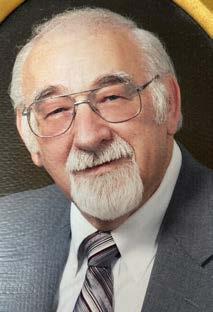
A funeral mass was celebrated Oct. 17 at Saint Vincent de Paul Catholic Church with Rev. Father Mark J. Hammond as the celebrant. Burial followed in the Mount Calvary Cemetery in Mount Vernon, Ohio, with military honors provided by the Knox County Joint Veterans Council.
CAROL M. CAMPBELL
Dec. 15, 1943 – Oct. 4, 2022
Nashville Musicians Association life member Carol M. Campbell, a.k.a. Carol Hardin, 78, died Oct. 4, 2022. She was a vocalist who joined Local 257 Nov. 28, 1984. She was also a longtime Local 257 staff member who worked in several positions including office manager and director of the recording department. Her grandfather, George Cooper, was thought of as one of the founders of Music Row, along with Owen and Harold Bradley. He was president of Local 257 for 36 years — the rehearsal hall bears his name.

Campbell was born in Nashville, Tennessee, Dec. 15, 1943, to the late Charles Pete Maguire and Jewell Suelnor Cooper. Family said Campbell enjoyed “the beach, traveling, and Elvis music, and was a strong Christian lady who loved and adored her family and the Lord.”
Survivors include her sons, Terry and Wes Hardin; four sisters, Pat McCoy, Sherrie Fries, Linda Clark, and Lana Cheek; one brother, Charles Garrett; four grandchildren; four great-grandchildren; and a host of nieces and nephews.
Funeral services were held Oct. 8, at Harpeth Hills Funeral Home. Memorial donations may be made to the Susan G. Komen Breast Cancer Foundation.
NESTOR EATON
July 14, 1946 – Jan. 17, 2023
Multi-instrumentalist Nestor Eaton, 76, died Jan. 17, 2023. He was the longtime guitarist for John Conlee, and played with many other bands as well. Eaton was a life member of the Nashville Musicians Association who joined Local 257 Sept. 1, 1987. He was born July 14, 1946, in New Mexico to Pete Charles and Lucy Mora Eaton. He started playing guitar and singing as a youngster, and performed for his elementary school’s special programs. When he was only nine, he was singing and playing guitar on local radio station KSRC, where he would take call-in requests. Before long he was in a band, performing at area dances. During his teenage years he helped out on the family ranch, but still found time to play music with several bands for dances and other gigs. Eaton distinguished himself in school — he won FFA awards, and was elected to attend Boys State in 1963.
He graduated from Socorro High School in 1964 and moved to Albuquerque. After service in Vietnam, he returned to playing music, performing frequently at the famous Caravan East and other venues. He also toured, and joined the Kenny Vernon band which played

APRIL – JUNE 2023 31 FINAL NOTES continued on page 32
continued from page 31
throughout the region. He also had his own band during this period, and in 1987 he moved to Nashville with his wife and son for a new phase in his musical career.
Eaton would go on to play with Doyle Holly, Barbara Fairchild, Johnny Russell, Shelly West, the Trailer Park Troubadours — where he was known as Nestor “Neutron” Eaton, a sly play on the physics definition of the term “nestor.’ He joined the Conlee band in 2004, and worked with them for 18 years as audio engineer and guitarist.
After Eaton’s passing, Conlee paid tribute to his longtime band member twice during events at the Grand Ole Opry held on Jan. 21 and Feb. 11.
Survivors include his wife of nearly 40 years, Jerilou; one son, Jaron Evan Eaton; one brother, Charles Eaton; and one sister, Delphine Armijo.
A Circle of Love Gathering was held Feb. 2 in Hendersonville to celebrate Eaton’s life. His favorite Southwestern foods were served, and family said the evening was “filled with music, love, and laughter, three qualities that were an everyday part of [Eaton’s] life.” Conlee performed at the remembrance event, as well as Damon Gray, a longtime friend, along with family members, and other musician friends.
JEFFREY ALAN COOK
Aug. 27, 1949 – Nov. 7, 2022
Guitarist, vocalist, and fiddle player Jeffrey Alan Cook, 73, died Nov. 7, 2022. He was a founding member of the supergroup Alabama, and joined Local 257 Feb. 27, 2012.
The Fort Payne, Alabama, native was born Aug. 27, 1949, to James and Betty Cook. His father owned an auto parts store and his mother was a homemaker. Cook developed a love for music and radio at an early age. He was playing guitar and keyboards at 13. At 14 he had obtained his third class “radio telephone” broadcasting license, and was soon hosting a show at a local station. He graduated from Fort Payne High School and then attended Gadsden State Community College, where he earned a degree in electronic technology. He built a home studio, and in the late ‘60s formed a band with his cousins, Randy Owen and Teddy Gentry.
The group forged their live performance skills playing locally, and in 1973 expanded their
range to include venues throughout the Southeast. They initially called the band Wildcountry, but changed their name to Alabama in 1977. They signed first with a regional label and had their first Top 40 hit with “My Home’s in Alabama.” In 1980 they appeared at CRS in Nashville, and soon after signed with RCA. Their first No. 1 single was 1980’s “Tennessee River.”
Alabama stayed with RCA throughout their monster success, until their retirement from touring and recording in 2004. They weren’t just regulars on the country charts with songs like “Down Home,” and “Love in the First Degree” — their 41 hit singles included crossover hits like “Love in the First Degree” and “Take Me Down.”
Alabama changed the course of country music — they were one of the first country “bands.” Prior to their arrival, country hits generally came from solo artists with backing bands. Not only did they charter a path for the deluge of country rock bands that followed them, but their extremely wideranging appeal infused the country music listener base with millions of new fans. Alabama was honored repeatedly by the industry, including eight CMA Entertainer of the Year awards. They were named Artist of the Decade by the ACM in 1989. Cook and Alabama were inducted into the Country Music Hall of Fame in 2005, and the Musicians Hall of Fame in 2019.
I N MEMORIAM
The officers, staff and members of Local 257 extend our deepest sympathies to the families and friends of our members who have recently passed away. You are in our thoughts, hearts and prayers.
After Alabama stepped back from recording and touring, Cook worked as a solo artist, releasing nine albums, including a collaboration with William Shatner. In 2001, Cook received the Orville H. Gibson Award as Guitarist of the Year by the Gibson Guitar Company, and he was recently inducted into the Fiddlers Hall of Fame. He received a Lifetime Achievement Award in 2020 at the Alabama Music Awards. Cook also founded Cook Sound Studios, and opened a restaurant, in addition to owning several radio stations over the years.
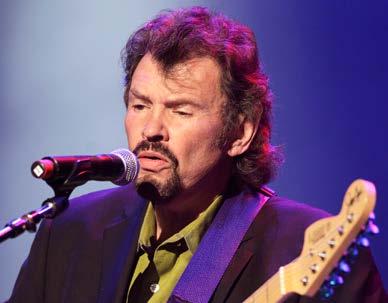
Survivors include his wife of 27 years, Lisa Cook; his mother, Betty Cook; one brother, David Cook; one sister, Crystal Cook; and many nieces and nephews.
In March bandmate Owen announced that the group would bring back its legendary June Jam festival, scheduled for the 3rd in Fort Payne, Alabama. A public memorial service for Cook will be one of the included events.
32 THE NASHVILLE MUSICIAN FINAL NOTES
Name Born Joined Died Life Member Samuel Lee Collins 02/25/1941 03/30/1974 04/09/2023 Y Ralph E Land 05/11/1946 09/04/1974 03/01/2023 Y Bruce Osbon 05/30/1939 11/16/1966 03/03/2023 Y Michael W Rhodes 09/16/1953 05/30/1974 03/04/2023 Y Marvin Glynn Russell 12/29/1936 08/29/1962 03/12/2023 Y Raymond N Russell 05/05/1956 01/31/2007 03/27/2023 Joe Mack Vincent 04/01/1931 12/15/1970 04/06/2023 Y TNM

NEW MEMBERS Laurence Moss Aberman Dean Berner Forrest Lee Bibbee, Jr Andres Daniel Blachere Emanuel Burks Julian Dorio Tracey K Houston James Simon Hutchison Philip M. Lawson Adam Gerard Lester John M Lomax, III Michael Lopinto Steven A Lupo David A Martin Paul Warren Martin Alexandru Iuliah Musat Pamela Davis Needham Johanna Marcela Pinella Monique L Ross Chaunte Ross George Frederick Saunders James B Stewart Rachel Rodriguez Viglianco Bradley G. Walker REINSTATED William Charles Adkins Roy Buell Agee Gary Allan Zachariah Phillip Arnold Rodney A Atkins Robert J Bare Nathan Barlowe Patrick W Bergeson Justin Bertoldie Emelyne Marie Bingham Larry L Borden Brandon Bostic Jimmy Bowen Robert Lewis Burns Larry E Carlton Kenny A Chesney Wendell Terry Cox Dana Eugene Cupp, Jr Randle Currie David H Davidson John Shelby Deaderick Jose Daniel De Assis Richard Deroberts Charles Alexander Stephan Diez Tonya Latish Dunn Joseph L Edwards David Nicholas Fenley Robert W Flint Joel Frahm Juan M Garcia Jimmy M Nichols Steve Andrew Gorman Gilles Alelard Godard Mark Kevin Grantt Melody Guy Gregory Michael Hagan Thomas Jay Hambridge Michael L Hartgrove Jeffrey Todd Hazard Nate Heffron Dennis Ray Hemingson Richard Conoley Herring Michael Brandon Hicks Justin Richard Hiltner Michael G Hite Austin Hoke Paul D Hollowell Brandon C Hood Bobby G Huff Jedd Michael Hughes David Huntsinger James E Hurst Jim C Isbell Kenneth R Janson Elizabeth A Jeffers Russell L Jeffers Bobby Jenkins Laur Joamets Calvin Johnson Courtney Jimel Johnson Kieran F Kane Donald W Kerce, Jr Annaliese E Kowert Stephen W Kummer Thomas David Larson Mary Helen Law Virginia Lee Carroll Jimin Lim William Eugene Linneman, Sr Jay Michael Lipschutz Philip K Madeira Jay Dee Maness Molly Martin Ethan Tyler Mattingly James Emmanuel Mayer John Leo McAndrew Cheryl Annette McClure Randy Lyn McCormick Patrick Thomas McInerney Mark Andrew Miller John Joseph Mock Craig Morrison Daniel Joseph O’Lannerghty Paul L Overstreet Stu Phillips Philip Chandler Towns Christopher Aaron Powell Mark Prentice Jonathan E. Radford Wesley Knox Ramsay Harry A Robinson Giovanni Rodriguez Robert A Ragosta Jason Lee Roller David M Santos Joshua R Schultz Lilah Senibaldi Jose Sibaja Harold E Skelton, Jr Kent Slucher MEMBER STATUS Alan Stoker Phillip Taylor Houston Bobby W Terry, Jr George Tidwell Terry Lee Townson Robert Joe Turley, III Robby O Turner Ted Wagner Craig Ryan Watson Bryan Shelton White Donald Lloyd White James Marshall White Lynn Williams Edward J Wilson Andy Witherington Andrew Whitten Wright Michael Younger EXPELLED Jerry Bob Abbott Kristopher Neil Allen Robert P Angello Rahsaan Jelani Barber Richard J Bascom, II Michael David Drane Hunter Roy Berry Christopher Bevacqua Ryan L Beydler Oliver B Bisagno Steven E Bishir Traci S Bishir James M Blackmon Charles L. Bradley Paula E Bressman Shawn P. Byrne Robert E Calder Clint Robert Chandler Ron Chancey Elton Christopher Charles Paul W Chrisman Pete Allen Coatney Bradley Matthew Corbin Marco Antonio Da Luz Coelho Gary Don Davis Elaine Davidson Day McKenzie Kelly David Nicholas Fenley Elizabeth Ann Ficalora Jerry Allen Flowers Shannon Otis Forrest Zachery Fowler Melinda Scruggs Gales Jacob E Garner Robert James Gateley David Nathaniel Girard Stephie Goings Benjamin Golden Gary Gold Richard C Griffin John G Grigsby, III Larry Thomas Harden Jason Hartless Tracy Matthew Heaston Ray W Herndon Jeffrey Thomas Hime Carmine Ioanna Robert Jennings Emily Jerde Dirk Johnson Gail Rudisill Johnson Gene C Johnson Thomas Johannes Jutz Ron Kirby Benjamin Clifford Kitterman Alexandra Kline Charles Adam Knight Mark Aaron Kreuzer Rhiannon G Laffan Carl J Larsen Joseph Layne John Duke Lippincott Crystal Dawn Lynn Timothy Jack May Merlin Gene Grigsby Peter David Mol John Edward Murray Mark E Nesler Scott D Neubert Gary T Nicholson Mark J. Oliverius Jeffrey Thomas Partin William M Pennington, Jr Robert Persaud Kevin M Post Jeverson Ramirez Christopher Rayner Jason Reeves Mary Ann Rodgers Ed Russell Nikki Lynn Setian Samantha R Setian Adam Shepherd Benjamin P. Sims Jeff P Siptrott Tyler K Skye Erin Slaver William L Smithson Janet M Stegall Tamara Marie Stroud Zander M Sugarman Daniel Truman Daniel Lewis Vaughan Elizabeth B Weitnauer Mark Wayne Whitehead Michael James Whitman William Monroe White, III Dana Keith Williams G Maxwell A Zemanovic TNM
DO NOT WORK FOR
The “Do Not Work For” list exists to warn our members, other musicians and the general public about employers who, according to our records, owe players money and/or pension, have failed to sign the AFM signatory documents required to make the appropriate pension contribution, or are soliciting union members to do nonunion work. When you work without the protection of an AFM contract, you are being denied all of your intellectual property rights, as well as pension and health care contributions.
TOP OFFENDERS LIST
Tommy Sims dba Positive Movement
Sims remains in contempt of court judgements from 2012 and 2022. He still owes more than $300K to musicians from a 2008 gospel project. Despite many promises he has only paid a fraction of his debt, and continues to avoid responsibility.
Nashville Music Scoring/Alan Umstead – solicitation and contracting nonunion scoring sessions for TV, film and video games. Musicians who work for them without an AFM contract are being denied appropriate wages and all intellectual property rights.
Electronic Arts/Steve Schnur – commissioning and promoting nonunion videogame sessions and exploiting musicians' intellectual property for his own gain.
These are employers who owe musicians money and have thus far refused to fulfill their contractual and ethical obligations to Local 257 musicians.
• Terry K. Johnson/ 1720 Entertainment (unpaid contracts/unauthorized sales –Jamie O’Neal project)
• Ed Sampson (producer) & Patrick Sampson (artist) (multiple unpaid contracts/ unauthorized sales) Sampson is now making small payments towards this debt.
• Revelator/Gregg Brown (multiple bounced checks/unpaid contracts)
• Beautiful Monkey/JAB Country/Josh Gracin
• Eric Legg & Tracey Legg (multiple unpaid contracts)
• Ray Vega/Casa Vega
• Quarterback/G Force/Doug Anderson
• Rust Records/Ken Cooper (unpaid contracts and pension)
• HonkyTone Records – Debbie Randle (multiple unpaid contracts/pension)
• Mike Barrios (unpaid live performance wages)
Membership ZoomMeeting
The next Local 257 General Membership Meeting will be held virtually Thursday, May 25, 2023, by Zoom teleconference at 5:30 p.m.
HOLIDAYS JUNETEENTH
Monday June 19, 2023
INDEPENDENCE DAY
UNPAID CONTRACTS AND PENSION
Knight Brothers/Harold, Dean, Danny & Curtis Knight
River County Band/SVC Entertainment
(unpaid demo conversion/pension)
UNPAID PENSION ONLY
Comsource Media/Tommy Holland

Conchita Leeflang/Chris Sevier
Ricky D. Cook
FJH Enterprises
Matthew Flinchum dba Resilient
Jeffrey Green/Cahernzcole House
Randy Hatchett
Missionary Music
Jason Morales (pension/demo signature)
OTB Publishing (pension/demo signature)
Tebey Ottoh
Ride N High Records
Jason Sturgeon Music
AFM NON-SIGNATORY
PHONO LIST
We do not have signatory paperwork from the following employers — pension may have been paid in some cases, but cannot be credited to the proper musicians without a signatory agreement in place. If you can provide us with current contact info for these people, we will make sure you get your proper pension contribution for your work.
604 Records
Heaven Productions
Stonebridge Station Entertainment
The Collective
Monday, July 3 and Tuesday, July 4
LABOR DAY
Monday, Sept. 4
34 THE NASHVILLE MUSICIAN
DO NOT WORK FOR
TNM
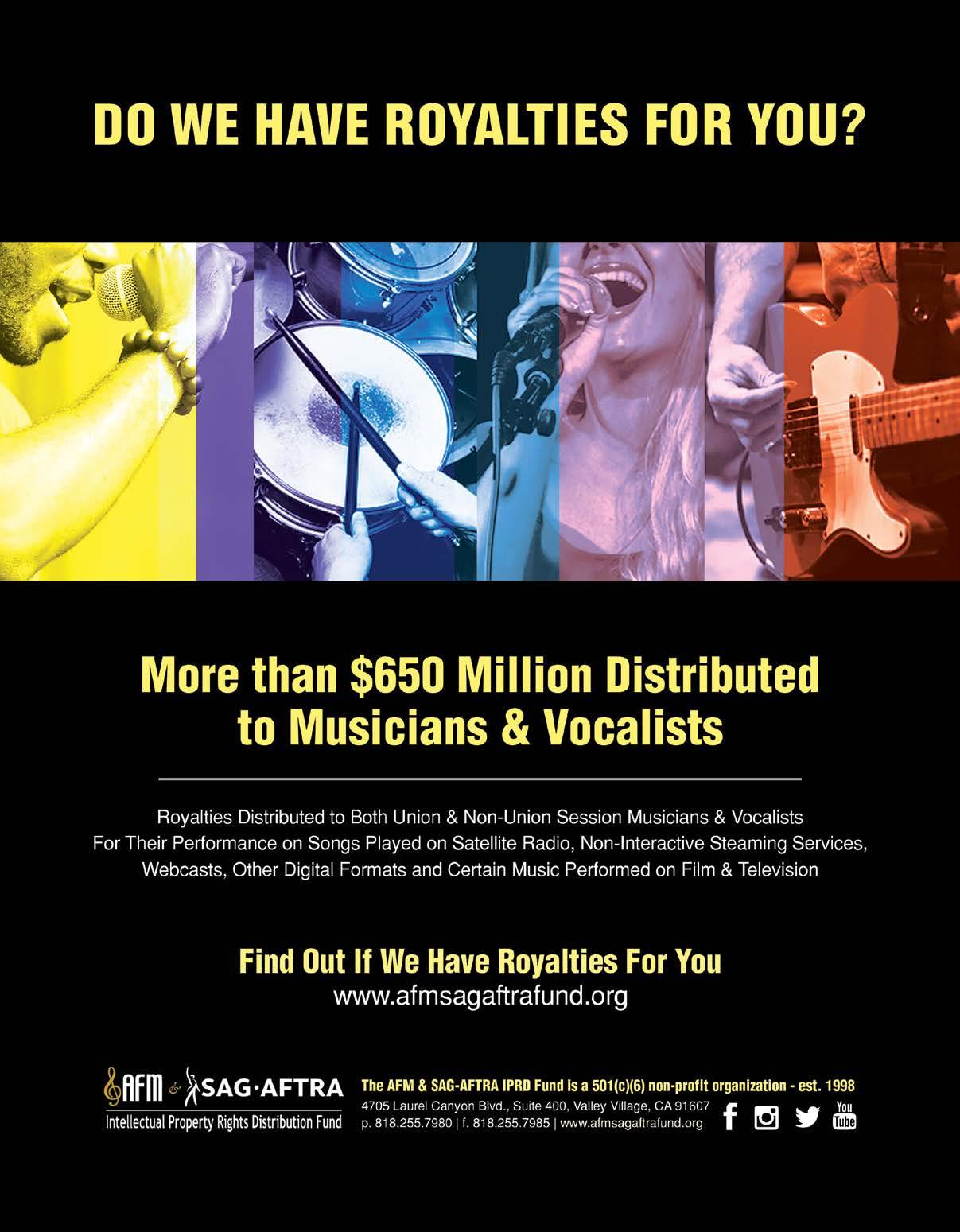


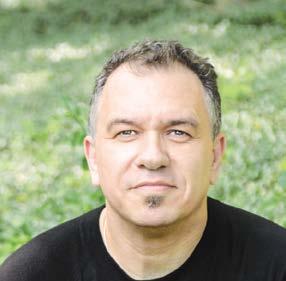




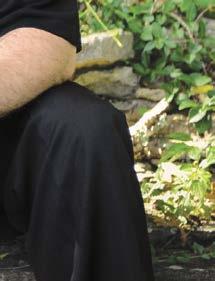

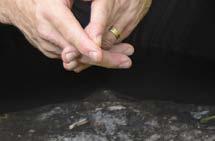

36 THE NASHVILLE MUSICIAN Nashville Musicians Association PO Box 120399 Nashville, TN 37212-0399 —Address Service Requested— Nonprofit U.S. Postage PAID Nashville, TN Permit No. 648 Allow me the honor of serving you in your next Real Estate endeavor, no matter how large or small. § MULTI-MILLION DOLLAR SALES § NASHVILLE REALTOR FOR OVER 10 YEARS § LOCAL 257 MEMBER FOR OVER 30 YEARS Proud Affiliate of The Realty Association MIKE HAYNES REALTOR, e-PRO, ABR, SRES www.NashvilleAbode.com LET’S GET YOU IN A HOME! 615.969.7744 cell | 615.358.9010 office IT’S NOT JUST BUSINESS, IT’S PERSONAL. REAL ESTATE. MHAYNES@REALTRACS.COM













 BY WILL BARROW
BY WILL BARROW













 1. Devin Malone performs for the Country Music Hall of Fame’s Musician Spotlight series.
2. Will Barrow and his group Tudo Bem demonstrate various samba and percussion styles at the Local 257 monthly world music workshop.
1. Devin Malone performs for the Country Music Hall of Fame’s Musician Spotlight series.
2. Will Barrow and his group Tudo Bem demonstrate various samba and percussion styles at the Local 257 monthly world music workshop.




































 BY MELINDA WHITLEY
BY MELINDA WHITLEY



































